PhD Interview Questions and Answers (13 Questions + Answers)

Most PhD applications include an interview. This allows your university (and perhaps even your prospective supervisor) to discuss the PhD with you in more detail.
This article lists some of the most common PhD interview questions along with their answers. The goal is to help you prepare for a PhD interview and pass with flying colors.

1) How did you develop this proposal?

When responding to this question, demonstrate your thought process, research skills, and the evolution of your ideas. Let's choose the subject of "Renewable Energy Integration in Urban Planning" as an example.
Sample answer:
"My proposal on 'Renewable Energy Integration in Urban Planning' originated from my undergraduate thesis on sustainable cities. Intrigued by the potential of renewable energy in urban environments, I conducted a literature review to identify gaps in current research. This review highlighted a lack of comprehensive strategies for integrating renewable technologies at a city-wide level. I then consulted with experts in urban planning and renewable energy, which provided practical insights into the challenges and opportunities in this field. I designed a methodology that combines spatial analysis with energy modeling to explore optimal renewable energy integration in urban landscapes. This proposal represents an amalgamation of academic research, expert consultation, and innovative methodology development."
This answer is effective because it mentions a literature review demonstrates the ability to conduct thorough research and identify gaps in existing knowledge.
2) Why do you wish to pursue a PhD?
For this question, it's important to articulate your passion for the subject, your long-term career goals, and how the PhD program aligns with these aspects.
Let's choose the subject of "Artificial Intelligence in Healthcare" for this example.
"I am passionate about leveraging technology to improve healthcare outcomes, and pursuing a PhD in Artificial Intelligence in Healthcare aligns perfectly with this passion. During my Master's, I was fascinated by the potential of AI to revolutionize diagnostic processes and personalized medicine. I believe a PhD will provide me with the deep technical knowledge and research skills necessary to contribute significantly to this field. My goal is to develop AI systems that enhance medical diagnostics, ultimately improving patient care and treatment efficiency. This PhD program, known for its pioneering research in AI and strong healthcare collaborations, is the ideal environment for me to develop these innovations and achieve my career aspirations in healthcare technology."
This is a great answer because you clearly state that the PhD will provide the necessary skills and knowledge, indicating a clear understanding of the purpose of the program.
3) Why do you think you are the right candidate for this PhD program?
Discuss how your research interests align with the program's strengths and the faculty's expertise. Explain how the program's resources, courses, and research opportunities can help you achieve your academic and career goals.
"I am deeply passionate about environmental science, particularly in the area of sustainable urban development. This passion was ignited during my master's program in Environmental Studies at XYZ University, where I completed a thesis on urban green spaces and their impact on city microclimates. This research not only honed my skills in data analysis and GIS mapping but also highlighted the importance of interdisciplinary approaches to environmental issues. I am drawn to your PhD program at ABC University because of its innovative research on sustainable urban planning and the renowned work of Professor Jane Smith in this field. Her research aligns with my interest in integrating green infrastructure into urban planning to mitigate climate change effects. My perseverance, attention to detail, and ability to synthesize complex data make me an ideal candidate for this challenging program. Pursuing this PhD is integral to my goal of becoming an environmental consultant, where I plan to develop strategies for cities to reduce their environmental footprint."
This response is effective because it mentions particular aspects of your experience and the program, avoiding generic statements. It also outlines how the PhD fits into your career path.
4) What do you plan to do after you have completed your PhD?
Be specific about the type of career you aspire to, whether it's in academia, industry, research, etc. Explain how the PhD will equip you with the skills and knowledge for your chosen career path.
"After completing my PhD in Computational Neuroscience, I plan to pursue a career in academia as a university professor. My doctoral research on neural network modeling will provide a strong foundation for teaching and conducting further research in this area. I aim to develop innovative courses that bridge computer science and neuroscience, addressing the growing demand for interdisciplinary knowledge in these fields. Additionally, I intend to continue my research on applying machine learning techniques to understand brain function, which has potential implications for developing new treatments for neurological disorders. This academic pathway allows me to contribute significantly to both education and research in Computational Neuroscience."
This is a great answer because it connects the PhD research directly to future career plans.
It also articulates how your work can impact both academia and the broader field of Computational Neuroscience.
5) Why have you chosen this specific PhD program?
Mention specific aspects of the program that attracted you, such as the curriculum, research facilities, faculty expertise, or reputation.
Explain how the program aligns with your research interests or academic background.
"I chose the PhD program in Artificial Intelligence at MIT because of its cutting-edge research and interdisciplinary approach, which perfectly aligns with my academic background in computer science and my passion for machine learning. The program's emphasis on both theoretical foundations and practical applications in AI is particularly appealing. Additionally, the opportunity to work under the guidance of Professor [Name], whose work in [specific area, e.g., neural networks or AI ethics] has deeply influenced my own research interests, is a significant draw. This program is an ideal fit for me to further develop my skills and contribute to the field of AI, ultimately aiming for a career in AI research and development in the tech industry."
This answer connects your background and goals to the program's offerings.
Including a specific professor's name shows detailed knowledge about the program and faculty.
6) What impact would you like your PhD project to have?
When answering this question, convey both the academic significance and the potential real-world applications of your research. Let's choose a project focused on developing eco-friendly battery technologies for electric vehicles for this example.
"My PhD project aims to develop new eco-friendly battery technologies for electric vehicles (EVs), addressing both the environmental impact of battery production and the efficiency of energy storage. I hope my research will contribute to the academic field by advancing our understanding of sustainable materials for energy storage, potentially leading to publications and patents. Beyond academia, I envision this project significantly impacting the EV industry by providing a more sustainable and efficient battery alternative. This innovation could play a crucial role in reducing the carbon footprint of transportation and supporting global efforts towards a greener future. Ultimately, I aspire for my work to not only advance scientific knowledge but also drive real-world changes in how we approach energy sustainability in transportation."
This is an excellent answer because it connects the project to larger environmental goals and societal benefits. It also reflects a forward-thinking approach, demonstrating your understanding of the project's potential long-term implications.
7) What difficulties would you expect to encounter during this project?
It's important to demonstrate awareness of potential challenges and convey a proactive mindset toward problem-solving. Let's choose a project focused on the development of a novel AI-driven diagnostic tool for early detection of neurological diseases for this example.
"In developing an AI-driven diagnostic tool for early detection of neurological diseases, I anticipate several challenges. Firstly, the accuracy and reliability of the tool depend heavily on the quality and diversity of the data used for training the AI algorithms. Obtaining a comprehensive dataset that adequately represents the population can be difficult due to privacy concerns and data availability. Secondly, ensuring the AI model's interpretability to be clinically useful while maintaining high performance is another challenge, given the complexity of neurological diseases. To address these, I plan to collaborate with interdisciplinary teams, including data privacy experts and neurologists, to source and utilize data ethically and effectively. I also intend to continuously refine the AI model, focusing on both its predictive accuracy and clinical applicability. These challenges, while significant, present valuable opportunities for innovation and interdisciplinary collaboration."
This response is effective because it clearly outlines realistic challenges specific to the AI diagnostic tool project. It also presents a proactive approach to overcoming these challenges, showing problem-solving skills.
8) How will you fund this project?
When answering this question, show that you've thought about the financial aspects of your research and are aware of funding sources that are available and applicable to your project.
"I have identified multiple funding sources to support my renewable energy research project at Stanford University. Firstly, I plan to apply for the DOE Office of Science Graduate Student Research (SCGSR) Program, which offers substantial support for projects focusing on sustainable energy. My proposal for this grant is already in progress, highlighting how my project aligns with the DOE's priorities in advancing clean energy technologies. Additionally, I'm exploring departmental fellowships at Stanford, particularly those aimed at renewable energy research. I am also keen on establishing industry partnerships, given the project's relevance to current energy challenges and the potential for collaborative funding and technological exchange. Last but not least, I will seek conference grants to present my research findings, which can lead to further academic collaborations and additional funding opportunities."
Notice how this answer mentions funding sources that align with the renewable energy focus of the project and the resources available at Stanford University.
9) Tell us about a time you experienced a setback
Focus on a situation relevant to your academic or research experience. Let's use a real-world example where a research experiment failed due to unexpected variables.
"During my Master’s thesis on the effects of soil composition on plant growth, I faced a major setback. My initial experiments, which involved growing plants in different soil types, failed to produce consistent results due to unanticipated environmental variations in the greenhouse. This was disheartening, especially as the deadline approached. However, I responded by reassessing my experimental setup. I consulted with my supervisor and decided to control more variables, such as humidity and temperature. I also refined my data collection methods to include more frequent soil and plant measurements. These adjustments led to more reliable results, and I successfully completed my thesis. This experience taught me the importance of adaptability in research and reinforced the value of meticulous experimental design."
This is a great answer because it shows how you’ve encountered and overcame a specific problem, demonstrating resilience and adaptability.
10) What are your strengths and weaknesses?
When answering this question, it's important to present a balanced view of yourself, showing self-awareness and a commitment to personal development. Choose strengths that are relevant to a PhD program and weaknesses that you're actively working to improve.
"One of my key strengths is my analytical thinking, which I demonstrated during my Master's project where I developed a novel algorithm for data analysis. This required me to not only understand complex theories but also apply them creatively to solve real-world problems. As for weaknesses, I sometimes struggle with overcommitment, taking on too many projects at once. This occasionally led to stress during my undergraduate studies. However, I am actively working on this by improving my time management skills and learning to prioritize tasks more effectively. I've started using project management tools and setting clear boundaries, which has already shown improvements in my workflow and stress levels."
This answer maintains a good balance between strengths and weaknesses. It also shows self-awareness, demonstrating a proactive approach to personal development.
11) Why have you chosen to study for a PhD at this university?
Mention specific aspects of the PhD program that attracted you. Explain how your research interests align with the work being done at the university.
"I am drawn to the PhD program in Astrophysics at Caltech due to its outstanding reputation in space research and the unparalleled resources available at the Owens Valley Radio Observatory. My research interest lies in the study of exoplanets, and Caltech's active projects in this area, such as the Zwicky Transient Facility, align perfectly with my academic goals. The opportunity to work under the guidance of Professor [Name], known for pioneering work in exoplanetary atmospheres, is particularly exciting. Additionally, Caltech's collaborative environment and emphasis on interdisciplinary research are conducive to my professional growth, providing a platform to engage with experts from various fields in astrophysics."
This response directly connects your research interests with ongoing projects and facilities at Caltech. It also shows you’ve done your research on faculty members and their work.
12) What can you bring to this research group?
Focus on your unique skills, experiences, and perspectives that will contribute to the research group's success. Let's choose the field of Biomedical Engineering at Johns Hopkins University for this example.
"As a prospective member of the Biomedical Engineering research group at Johns Hopkins University, I bring a unique combination of skills and experiences. My expertise in microfluidics, honed during my Master’s research, aligns well with the group’s focus on developing lab-on-a-chip devices for medical diagnostics. I have also co-authored two papers in this field, demonstrating my ability to contribute to high-impact research. Additionally, my experience in a start-up environment, where I worked on developing portable diagnostic tools, has equipped me with a practical understanding of translating research into applications. I thrive in collaborative settings, often bringing interdisciplinary insights that foster innovative problem-solving. I am excited about the prospect of contributing to the group’s ongoing projects and introducing fresh perspectives to advance our understanding and application of biomedical technology."
This response shows your relevant expertise, ability to work in a team, and the unique perspectives you can offer, positioning you as a valuable addition to the research group.
13) Do you have any questions for us?
Asking good questions demonstrates your motivation. It also shows that you’ve given some genuine consideration to the project and/or program you’re applying to.
Some questions you can ask the interviewer include:
- What will the supervision arrangements be for the project?
- What kind of training and skills sessions are offered as part of the PhD program?
- How many other PhD students has this supervisor seen to completion?
- Are there any major developments or partnerships planned for the department?
- Are there likely to be any changes to the funding arrangements for the project?
- What opportunities will I have for presenting my research?
Remember: you’re a good student, with lots of potential. You’re considering at least three years of hard work with this university. You need to know that you’ll get on with your supervisor, that your work will be appreciated and that there are good prospects for your project.
What to wear to a PhD interview
Wear formal attire for a PhD interview. Your best bet is to wear a suit. A navy blue suit is the best and most versatile option. No matter your gender, a suit is always very professional.
For men, wear a suit with a tie, dress shirt, and dress shoes. For women, wear a suit (pantsuit or skirt suit) with a blouse, or conservative dress, and closed-toe shoes.
When in doubt, it’s better to be slightly overdressed than underdressed. The goal is to make a professional impression and feel confident, without your attire distracting from the conversation.
What to expect from a PhD interview
At its core, a PhD interview will consist of questions that allow your potential supervisors to get to know you better and have an understanding of what you’d like to study, why you’ve chosen your field of study, and whether you’d be a good fit for the PhD program.
You should expect general questions to help the interviewer get a sense of your likes and dislikes, and your overall personality.
Next, expect questions about your personal motivations for studying a PhD. Your interviewer will also be interested in any relevant experience you have to qualify you to study this PhD.
In the next section, expect questions about your PhD project. You should be prepared to discuss your project idea in detail and demonstrate to the interviewer that you are the ideal candidate.
Last but not least, the interviewer will discuss your future ambitions and give you an opportunity to ask questions. Remember that this interview goes both ways.
It’s important to ask the interviewer relevant questions to show your engagement and the serious consideration you are giving their program.
You are preparing to spend several years of your life at this school. Think about what is important to you and what would make or break your decision to attend this university.
Prepare a list of questions ahead of the interview.
Understanding the interviewer’s point of view
During a PhD interview, interviewers are typically looking for a range of traits that indicate whether you are well-suited for the rigors of a doctoral program and a research career.
These traits include:
Intellectual Curiosity and Passion: A strong enthusiasm for the subject area and a desire to contribute to and expand knowledge in the field.
Research Skills and Experience: Demonstrable skills in conducting research, including designing experiments, collecting and analyzing data, and interpreting results. Prior research experience relevant to the PhD topic is often a plus.
Resilience and Perseverance: The capacity to handle setbacks and challenges, which are common in research, and to persist in the face of difficulties.
Collaboration and Teamwork: Although PhD research can be quite independent, the ability to work well with others, including advisors, faculty, and other students, is crucial.
Self-Motivation and Independence: The drive to work independently, manage one's own project, and stay motivated over the long term.
Fit with the Program: Alignment of the candidate’s research interests and goals with the strengths and focus of the PhD program and faculty.
These traits not only indicate your readiness for a PhD program but also your potential to contribute meaningfully to their field of study and succeed in a research-oriented career.
Related posts:
- University Interview Questions (16 Questions + Answers)
- Project Manager Interview Questions (14 Specific Questions + Answers)
- Strength-Based Interview Questions (21 Questions + Answers)
- Engineering Interview Questions (15 Questions + Answers)
- Business Analyst Interview Questions (17 Questions + Answers)
Reference this article:
About The Author

PracticalPie.com is a participant in the Amazon Associates Program. As an Amazon Associate we earn from qualifying purchases.
Follow Us On:
Youtube Facebook Instagram X/Twitter
Psychology Resources
Developmental
Personality
Relationships
Psychologists
Serial Killers
Psychology Tests
Personality Quiz
Memory Test
Depression test
Type A/B Personality Test
© PracticalPsychology. All rights reserved
Privacy Policy | Terms of Use
Top 10 PhD Interview Questions
So, you’ve been invited for a PhD interview. Congratulations! This means that the admission committee thinks you are qualified and capable of doing a PhD at their university. The interview will allow the committee to determine if you’re a good fit, and you have the motivation and drive to complete a doctorate. While you cannot predict the exact questions you will be asked, certain topics are almost inevitable. Here are ten common PhD interview questions.
1. Tell us about yourself
This is a popular opener for just about any type of interview. It’s meant to be an easy icebreaker, but that doesn’t mean there isn’t a wrong answer. Make sure to your response is relevant to the context of a PhD interview. Talk about your academic background, motivation, and interests. You don’t have to get into the details at this point, just give an overview.
2. Why do you want to do a PhD?
This is another straightforward question that doesn’t have a straightforward answer. A PhD is a big undertaking and you’ll have to be driven to see it though. Your answer should address your motivation for doing a PhD in a way that conveys your passion and enthusiasm for the subject.
3. Why are you interested in this program?
What drew you to this program and this school? Does it have a unique feature or take a different approach than other programs? Are there certain professors you are interested in working with? Your answer to this questions shows you have done some research and are ready to engage in the department. It’s also an opportunity to demonstrate that you don’t just want a PhD, you want one from this school.
4. What experience makes you a good candidate?
Yes, the interviewer has read your CV, but this question allows you to draw their attention to specific qualifications or skills that might not be obvious from just your resume. Talk about courses you have taken that have taught you the necessary skills for graduate work or give examples of past research experience from your Bachelor’s or Master’s.
5. How did you develop this proposal?
There are no trick questions here. The interviewer wants to see that you are engaged with the field and spent some time preparing your proposal. Take them through your thought process and discuss the background reading and research you did. What other approaches did you consider before deciding on this one? What will your project contribute to the field?
6. What difficulties would you expect to encounter during this project?
No matter how carefully you plan, no project goes off without a hitch. Be honest about where you see potential difficulties, but more importantly discuss how you plan to work through them.
7. What are your strengths and weaknesses?
Another classic interview question, and one you definitely don’t want to be answering off the top of your head. Pick a strength that is relevant to this position and then give a few examples of how you have used it well. When it comes to choosing a weakness, be truthful and then (using examples again) talk about how you have been working to overcome it.
8. Tell us about a time you experienced a setback
The next three to six years of your PhD won’t be smooth sailing. You are likely to hit many snags along the way. The interviewer wants to know you are resourceful and can handle these setback. Try to think of an academic challenge you have had to overcome rather than a personal one.
9. What are your future career plans?
This is another way to suss out your motivations for doing a PhD and see if you have given a thought to what comes after your doctorate. How will a PhD help you achieve your future goals? Someone with a clear goal in mind is likely to be more committed to doing a PhD. For many, the goal will be to pursue an academic career, in which case this is an opportunity to show you understand the academic career path.
10. Do you have any questions for us?
Remember that this interview goes both ways. It is important that you have some questions to ask the interviewer to show your engagement and the serious consideration you are giving their program. You are preparing to spend several years of your life at this school. Think about what is important to you and what would make or break your decision to attend this university. Prepare a list of questions ahead of the interview.
The interview is your time to shine, and being prepared will allow you to do just that.
Discover related jobs
Discover similar employers
Accelerate your academic career
Moving to Luxembourg to Research
Luxembourg has long been known as a leading European financial centre, b...
The Best Questions to Ask During a PhD Interview
Coming to a PhD interview prepared with some questions to ask shows the ...
"I found my PhD position on Academic Positions."
When I started looking for positions abroad in Sweden, I came across a p...
Everything You Need to Know About the GRE
Depending on where you plan to apply for graduate school, you may have t...
Keep Calm and Ace Your Interview
These tips to help manage your nerves before, during, and after the inte...
PhD, Postdoc, and Professor Salaries in Sweden
Sweden is a favourite destination for academics. Here's a breakdown of t...
Jobs by field
- Machine Learning 172
- Electrical Engineering 165
- Artificial Intelligence 161
- Programming Languages 132
- Molecular Biology 111
- Electronics 100
- Materials Chemistry 99
- Cell Biology 93
- Management 90
- Computational Sciences 90
Jobs by type
- Postdoc 310
- Assistant / Associate Professor 177
- Professor 131
- Researcher 128
- Research assistant 95
- Lecturer / Senior Lecturer 73
- Engineer 56
- Tenure Track 52
- Management / Leadership 50
Jobs by country
- Belgium 266
- Netherlands 169
- Switzerland 124
- Luxembourg 48
- United Kingdom 46
Jobs by employer
- KU Leuven 96
- Mohammed VI Polytechnic Unive... 94
- ETH Zürich 70
- Ghent University 65
- Eindhoven University of Techn... 49
- University of Luxembourg 46
- KTH Royal Institute of Techno... 45
- University of Twente 42
- Manchester Metropolitan Unive... 38
This website uses cookies

Community Blog
Keep up-to-date on postgraduate related issues with our quick reads written by students, postdocs, professors and industry leaders.
Questions to Ask During Your PhD Interview

- By Zebastian D.
- August 22, 2020

As someone applying for PhD positions, you’ll no doubt be thinking of and preparing for the interview with your potential supervisor(s). You’re absolutely right to be doing this and planning your answers to some of the PhD interview questions that they’ll probably ask you; make sure you’ve read our guide on this to help you prepare.
Remember though that the PhD student-supervisor relationship works both ways; as much as the potential supervisor is interviewing you for a PhD position within their lab, you should also have the mindset that you’re also interviewing the professor for the role of supervisor, and be ready to ask questions! Ultimately the key thing you want to know after your PhD interview is you are both a good fit for each other.
With that in mind, I’ve prepared a common list of questions that you should consider asking to help you decide if the supervisor and the research lab is the right fit for you. You don’t need to ask all these questions but instead use this list as a guide for picking what feels most important to you.
I should also note that some of the answers to these questions can usually be found through a quick Google search of the potential supervisor or looking at their university profile. So do think about which questions in particular you want to bring up in person at the PhD interview.
Now on to the questions….
How many PhD students have you supervised previously, and did they all gain their PhDs?
You’re asking this to firstly work out how experienced the professor is at supervising students, based purely on the numbers previously supervised. The reason to ask the second question of how many students gained PhDs is to get an idea of the supervisor’s track record of successful supervision. The lower the percentage of students that went onto complete their PhD under his or her supervision (and not leave the program early ), the more alarm bells that should be ringing for you. This of course shouldn’t be your only data point in the decision-making process, and you should try and find out more about why those that left their PhD program before completion, did so. Equally it’s also a possibility that some students have been successful in their PhD research in spite of a supervisor’s lack of support. A good way to get a truer sense of this is by speaking to the supervisor’s current and past students.
Whilst a supervisor’s successful track record can be reassuring, don’t be put off if they haven’t supervised many (or even any) students before, particularly if they’re still fairly new in the job. There are many other ways in which you can get a sense of the supervisor-student fit.

How many years does a PhD project usually take in your lab?
If you’re in the UK, a full time PhD should normally take you 3-4 years to complete , as reflected by most funding grants for PhD research being for this time frame. You want to know and have some reassurance that most students in this lab do finish within this time frame. Asking this question will also help you better understand the supervisor’s attitude towards completion time frames; is this someone that would have no issue with a student that’s been working on their PhD for 6 years or are they driven to help students complete ‘on time’.
What are the key milestones for progression that you expect from students?
This is a good follow on from the previous question. Some supervisors can be very ‘hands off’ and set no expectations on their students about deliverables and if this is the type of student-supervisor relationship you’re after (which some are), then perfect!
However, whilst a PhD project is an independent body of work, that doesn’t mean you have to do it in isolation. Having a supervisor that also acts as a mentor is important; a key aspect of this is to help keep you on track to complete your project ‘in time’, which is most effectively done using regular milestones.
The actual milestones will vary between supervisors but what you’re looking for in their response is some indication that they’ve actually thought about them. Examples of milestones may be the completion of the literature review within the first 6 weeks of starting, first experimental data captured by month 3 and first paper published by the time you end year 1.

How many other students do you supervise?
You ideally don’t want your supervisor to have too many (>5) other PhD students under his or her supervision at any one time, simply because of the dilution of their time that will naturally occur. Being part of an active research lab is a big advantage however, so you don’t necessarily want to be the only student under their supervision either. Remember that the professor may also be responsible for several Master’s and undergraduate students too so you just need to know what to realistically expect from him in terms of available time to meet with you regularly.
How often do you meet with your PhD students?
You don’t want a supervisor that’s too prescriptive in how you run your project, but you do want someone who you know you can rely on to meet with regularly. Some professors set weekly one-on-one or group research meetings that occur at the same time, day and venue; you know exactly what you’re getting here. Others tend to meet less frequently but still at regular intervals. A good balance would be to have catch up meetings every 2 weeks but it’s important to know upfront what the expectations are from both sides about how often to meet.
Finding a PhD has never been this easy – search for a PhD by keyword, location or academic area of interest.
How flexible is the direction of the PhD project?
At the PhD level of higher education, the supervisor is there to provide mentorship and guidance to help you avoid going in a completely wrong direction with your research. You should however expect to have the freedom to take your project in any direction you want to (within reason). This should be the case even if it means deviating from the original research questions that were proposed at the start; you and your supervisor should be in agreement before you start about how much flexibility there can be. Remember too that sometimes the project may have to stay closely aligned to the original plan if it’s required by the industry funder, so this decision may be out of the supervisor’s hands to some extent.
What funding is available for this project?
You should know by the time you come to interview if the project is to be self-funded or if there is specific funding associated with it. It may feel like an awkward question to ask but you need to be very clear on how much of a living stipend you should expect and if there is any additional funding for things such as conference travel, paying for journal publication fees or other bench fees; you don’t want any unpleasant surprises about finances when you’ve already started the PhD.

Do you expect there to be any changes in funding during the course of the project?
Specifically, you want to find out if there’s any risk that the funding associated with the project could be removed. Most often, funding bodies don’t transfer the entire monetary amount of the agreed funding up front in one lumpsum (which can be in excess of £75,000 for a 3-year studentship). Instead, payments are made in instalments and may be done so on the basis that certain milestones are met. For industry funded projects, for example, there may be a service work element (such as specialist analysis using university-based equipment) associated with the funding which will need to be delivered on time for the university to continue to receive money. In reality a complete loss of funding is unlikely to happen, but you should find out if this is at all a possibility of happening.
What is the source of the funding?
It’s important for you to understand how your project will be funded. As discussed in the previous question, the specific funder may place certain requirements on the university that need to be fulfilled to receive the funds. Don’t let this put you off applying or even impact your decision to take on the specific project, but it’s an important factor to be aware of.
Are there any opportunities to earn additional money as a PhD student?
Even if you will receive a stipend during the course of your research project, it comparatively won’t be a lot of money to live on. If you want it, the opportunity to earn extra money can make a big difference in managing your finances. This may in the form of one day/week working as a research technician or paid work preparing and delivering lectures to undergraduate students. It’s useful to know if these opportunities will exist to help you manage your expectations about your finances. Make sure you don’t let yourself feel obligated to take on this additional work however, even if it is paid; the priority will be ensuring your research progresses on schedule.
Will I have the opportunity and be expected to publish papers?

In the UK there is no requirement for you to have published any journal papers before you are awarded a PhD. Doing so however can go some way towards making your final viva that much easier, and also giving you a ‘head-start’ on your publication track record if you continue on into academia after your PhD.
You should get a sense of if your potential supervisor sees an opportunity for you to publish your research, if this is something that you want to do. Equally you should be aware of the supervisor’s expectations about publishing to avoid any potential conflict between your supervisor wanting you to publish work during your PhD and you wanting to wait until you’re in the post-doc stage before writing papers.
How many papers have previous PhD students published with you?
Knowing the answer to this should give you a good idea about the expectations and opportunities of publishing papers during your PhD. It’s certainly a positive sign to know that previous students have successfully published their research and is often a sign of a good supervisory system being in place.
How often does your research group present at academic conferences?
Having the opportunity to present your research at an academic conference is a key experience to have obtained during your time as a PhD student. Some supervisors actively encourage this and ensure that all funding applications include allocations for paying for conference related fees. Others are less convinced about the value of students going to conferences, particularly due to the additional expense of doing so, and may therefore not be as supportive of conference participation.
It’s useful to know what the norm is within the supervisor’s research group so that there are no surprises further down the line.
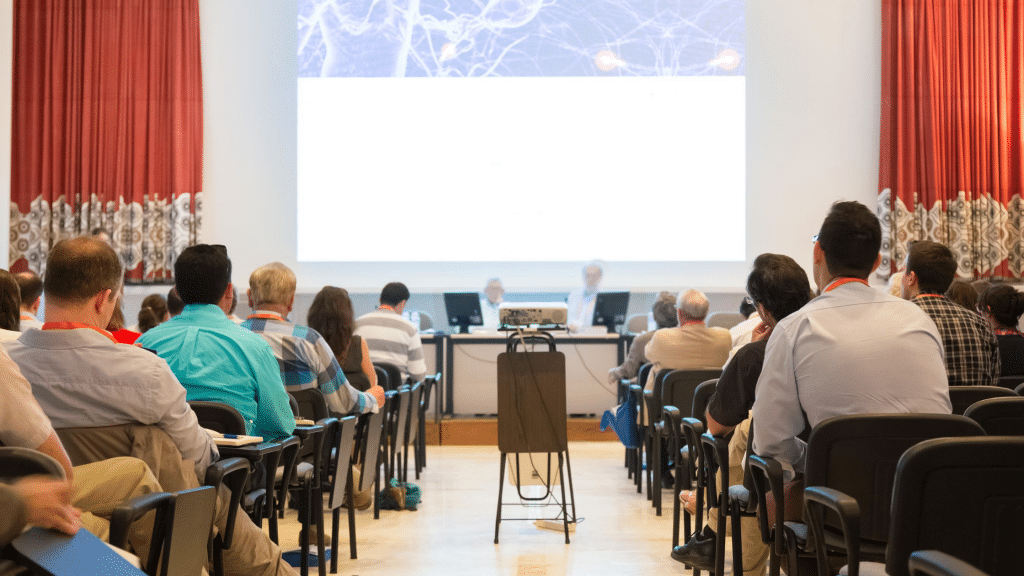
Is there funding support available for attending conferences?
Again, to be clear on expectations of funding and support for conference attendance, you should find out if there are funds specifically allocated for this purpose. If there aren’t, does the supervisor actively provide support to their students in applying for additional funding for this?
Are there courses and training sessions available for PhD students?
Find out if there are extra resources available to you should you want to use them. For example, do the supervisors students go on paper writing courses, or workshops on how to perform literature reviews? There are lots of new things that you’ll be doing during your PhD, especially at the beginning so it’s good to know that there’s external help available if and when you need it.
What are your past PhD graduates doing now?
This is an interesting one to find out from the supervisor. Are most of their graduates continuing their career development within academia or have many moved into industry work or even to a field completely different to their area of research? Ideally, you’d want this to align with your own career options. If most PhD holders have gone into industry whereas you want to pursue an academic career, you should try and find out why they ended up leaving academia. For example, did these graduates initially have aspirations of becoming professors themselves but were not able to do so or does your particular field normally open up more opportunities within industry?
What kind of support do you or the university provide for helping with jobs after?
In particular, what role does the supervisor play in helping their recent PhD graduates find their next job role? Do they have any connections within industry that they’d be able to help you network with? Or have any of their past PhD students stayed on in the lab as post-docs and are there resources in place for you to potentially do the same?
Will there be opportunities to teach undergraduate students?
The opportunity to give lectures to undergraduate students or lead tutorials with them can be a good way to earn some extra money during your PhD (note though that not all universities/departments formally pay PhD students to do this). Getting teaching experience is also important if you’re planning on continuing on down an academic career path at a university so it’s useful if you can gain some of this during your PhD.
Do you as a lab do any team activities together?
This will help you get a sense of the environment you’ll be working in for at least the next three years. Is this a lab with several PhD students and post-docs that make up an active ‘research family’? Does the team ever go out for lunch together or day trips away together to unwind? This can be a great way to build a sense of comradery in a research job that can often feel like you’re working alone in. Some supervisors actively encourage and get involved in nurturing a team environment whilst others are more hands-off, leaving the students to do their own thing.

What is the work environment like? Do students work in a shared office space?
Be clear on what your daily workspace will be like at the lab and university. Do all PhD students sit together in an open space or are there smaller office spaces for one or two students to work in? Some people prefer the buzz of an open space whilst others like the quiet of lone working. Either way, you should know what your work environment will look like for the next three years and plan accordingly (e.g. buy some noise cancelling headphones if you need some quite time in the open plan office).
I’ve given you a number of different questions to think about and ask your potential supervisor at your PhD interview. Not all of them may be relevant, or even appropriate to ask, so do think carefully about which ones you do want to bring up at the interview and which answers you could find out independently by either speaking to other students or looking online. Your research project and your experiences at the university will be so much more enjoyable if you can make sure you and your supervisor are a good fit for each other. The best way to do this is to ask questions!

Need to write a list of abbreviations for a thesis or dissertation? Read our post to find out where they go, what to include and how to format them.

This post gives you the best questions to ask at a PhD interview, to help you work out if your potential supervisor and lab is a good fit for you.

Stay up to date with current information being provided by the UK Government and Universities about the impact of the global pandemic on PhD research studies.
Join thousands of other students and stay up to date with the latest PhD programmes, funding opportunities and advice.

Browse PhDs Now

PhD stress is real. Learn how to combat it with these 5 tips.

The answer is simple: there is no age limit for doing a PhD; in fact, the oldest known person to have gained a PhD in the UK was 95 years old.

Rakhi is a PhD student at the Institute of Chemical Technology, Mumbai, India. Her research is on the production of Borneol and Menthol and development of separation process from the reaction mixture.
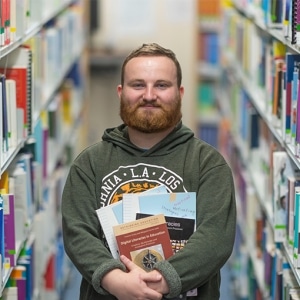
Sammy is a second year PhD student at Cardiff Metropolitan University researching how secondary school teachers can meet the demands of the Digital Competence Framework.

Join Thousands of Students
A Site for Higher Mathematics
PhD & JRF Position Interview Asked Questions & Experiences(Collections)
Here we have shared some of the Interview Questions asked in PhD Exams, the Experience of Candidates and their Suggestions. Hopefully, this page will be helpful for you in your preparation for PhD Interviews & Exams. This piece of information is shared only for educational purposes.
We request all of you, if you have recently appeared in a Ph.D. interview or Assistant Prof. Interview or JRF Position Interview, please share your Interview Que. /Experience /Suggestions to us for others’ benefit, Your little contribution can help New aspirants to prepare themselves.
Send your interview Que/Videos us on [email protected] . Subscribe Us On
Page Editor: P Kalika
YouTube Playlist of PhD Interview Experiences/suggestions: https://www.youtube.com/playlist?list=PLDu0JgProGz4Bnzvq7sRfEsklmGivnkay
❤️ We hearty thanks to those persons who shared their Interview Questions & Experiences for others’ help. We wish you all the best for your future.
🎯 ISI Phd Math Jrf Interview Ques (Anonymously shared, October 2023) .
(Added on March 31, 2024)
- Show that in an odd order group every element has a unique square root.
- What can you say about a group with a trivial automorphism group?
- Identify Z[i]/(1+3i).
- X be a subset of the sequence space,l^1 such that the nth term of each x:=(x_n) in X is bounded above by 1/n^2. Then show that X is compact.
- Types of singularities.
- If a function is continuous on C and analytic on C\{0}, is it entire ?
🎯 Ques asked at IIT Delhi PhD Interview (Shared by Jasveen Kaur , August 2023) .
- What is the property regarding eigen values of real symmetric matrix proof?
- If A is a real matrix of order 2 one eigenvalue is 2+i what is its trace?
- What is eigen value Caley Hamilton them?
- General characteristic pol eqn of order 2?
- A matrix of order n has char polynomial monic poly of degree n
- Can a3+2a +1 be char eqn of any matrix of order 3 why or why not
- Diagonlizable matrix defn
- Can ques 2 matrix be diagnolsble why
- Why distinct eigen value is necessary condition
- What if eigenvalues are not distinct
- Differentiability at point xo
- Diff implies continuity proof
- Converse true or not give an example
- Local minima in fnc of one variable
- Diff of a function of two variables
- Local minima of func of two variable
- What about global minima
- If f is linear fnc local minima at xo
- Is it global minima or not?
🎯 Interview Experience of ISI M.Math at ISI Bangalore (Shared by Anonymously , July 2023) .
(Added on March 31, 2024 )
I was asked my preference and I replied with Basic Analysis and Algebra. They asked me two questions, one from Analysis and the other from Algebra.
They sufficiently helped me by providing hints along the way. I’m attaching the asked questions.

🎯 Interview questions in NBHM, TIFR-CAM, IISER TVM (through NBHM channel), and NISER (Shared by Drishti Sunder Phukon , June 2023) .
Sir, I would like to submit interview questions in NBHM, TIFR-CAM, IISER TVM (through NBHM channel), and NISER so that it would help others. Please find attached the pdf of the same.
I got selected for NBHM masters scholarship, and waiting for results from IISER TVM and NISER.
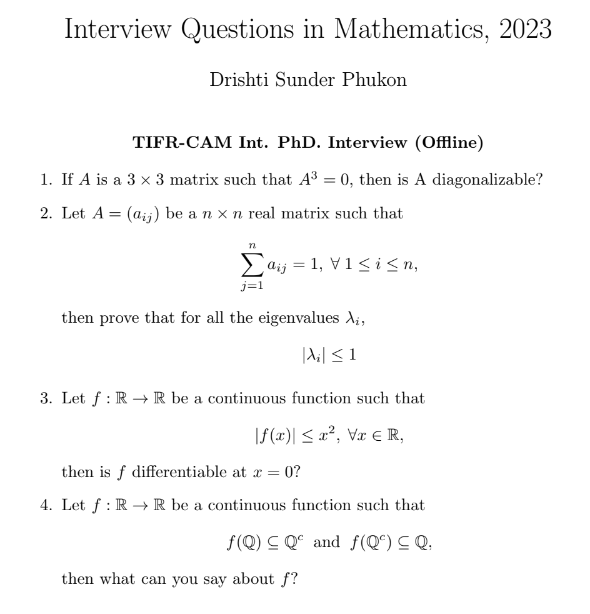
🎯 IIT Kanpur Phd-Interview Question (Shared by Surajit Pal, May 2023 ) .
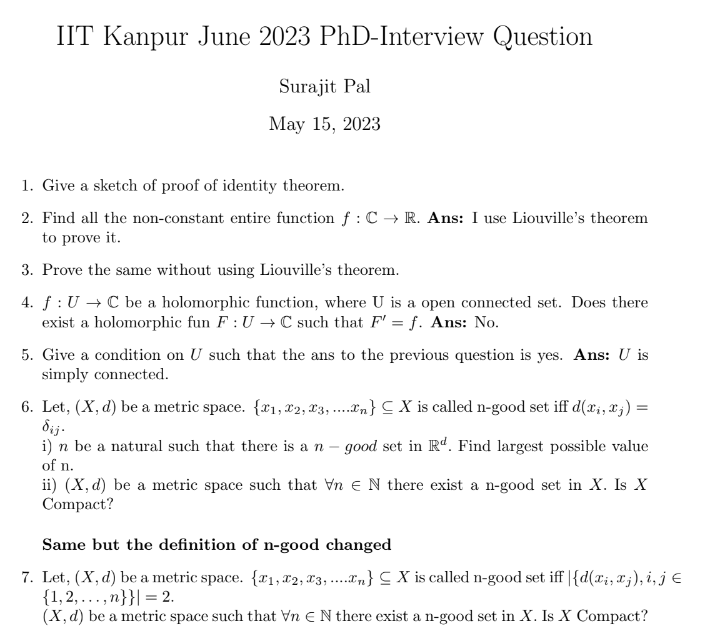
🎯 PhD Interview questions asked at IIT Ropar (Shared by Bikky Gupta) .
(Added on May 06, 2023)
“Last I got a mail from IIT Ropar I selected in Phd program, your collection of question give me idea how to prepare for interview, Thank you so much from bottom of my heart. I have question that they ask during my interview. I am attaching here.
🎯 PhD Interview questions asked at IIT Bombay, Kanpur, Jodhpur, Hyderabad, Madras & IISER Pune (Shared by Anik Bhowmick) .
‘I am Anik Bhowmick, I have appeared in several PhD interviews this year. I have attached a pdf so that you can share it and help students around the world.’
(Added on May 05, 2023)
🎯Interview questions asked at IIT Bombay, Kanpur and NBHM PhD (Anonymously received) .
(Added on 18-12-2022)
🎯Interview questions at IISER Pune and IIT Guwahati (Anonymously received) .
I had given an interview at IIT Guwahati and IISER Pune in the June session. In IISER Pune, they asked questions from linear algebra, ordinary differential equations, real analysis. They are as follows.
- What is the minimal polynomial. What is the characteristic polynomial.
- What are the relationship between minimal polynomial and charactestic polynomial. Can you proof those relationships between minimal polynomial and charactestic polynomial. In ordinary differential equations, they asked questions from uniqueness and existence theorem. Statement and example of uniqueness theorem.
- What is the reimann integration. They asked some examples of reimann integration.
- What is the uniform convergence in sequence of functions.
- Is continuity implement the uniform convergence of sequence and series of functions. Can you proof it .
During IIT Guwahati, they asked questions from partial differential equations.
- Write down the general equations of second order pde.
- What is the heat equations. In heat equations,.what are the parameters.
- Can you proof the heat equations, from where it is derived .
(Added on 30-07-2022)
🎯 NBHM PhD 2022 Interview Questions shared by Bittu Singh .
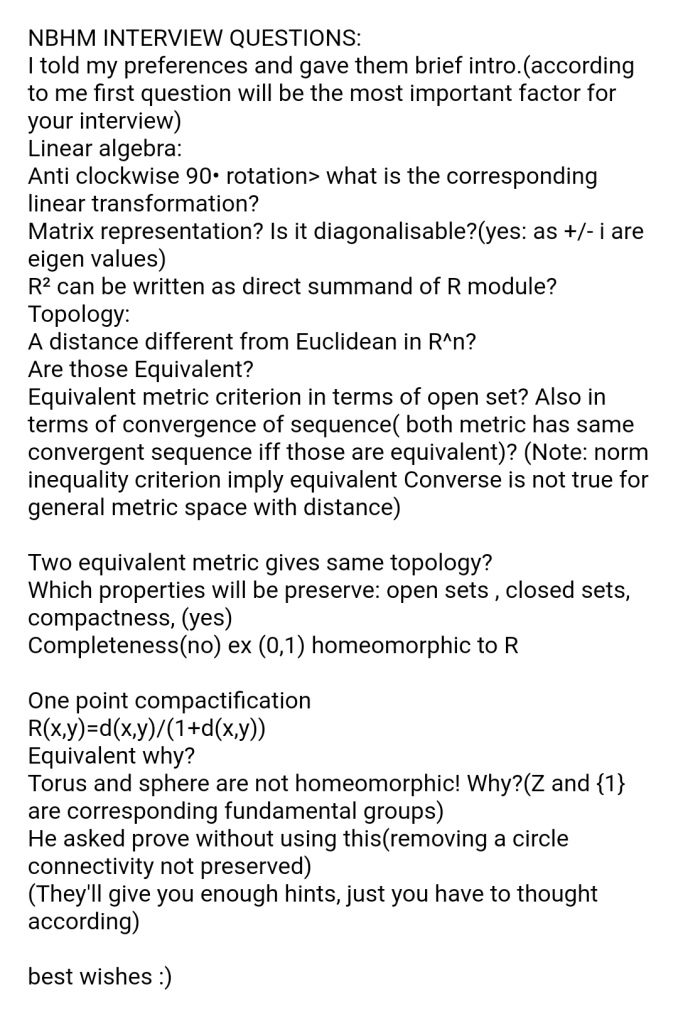
🎯 CMI PhD Interview experience (Anonymously Shared)
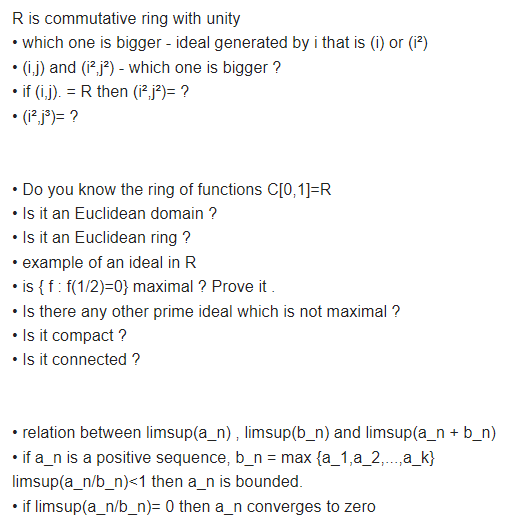
🎯 IISER Pune PhD 2022 July Interview questions shared by Umesh
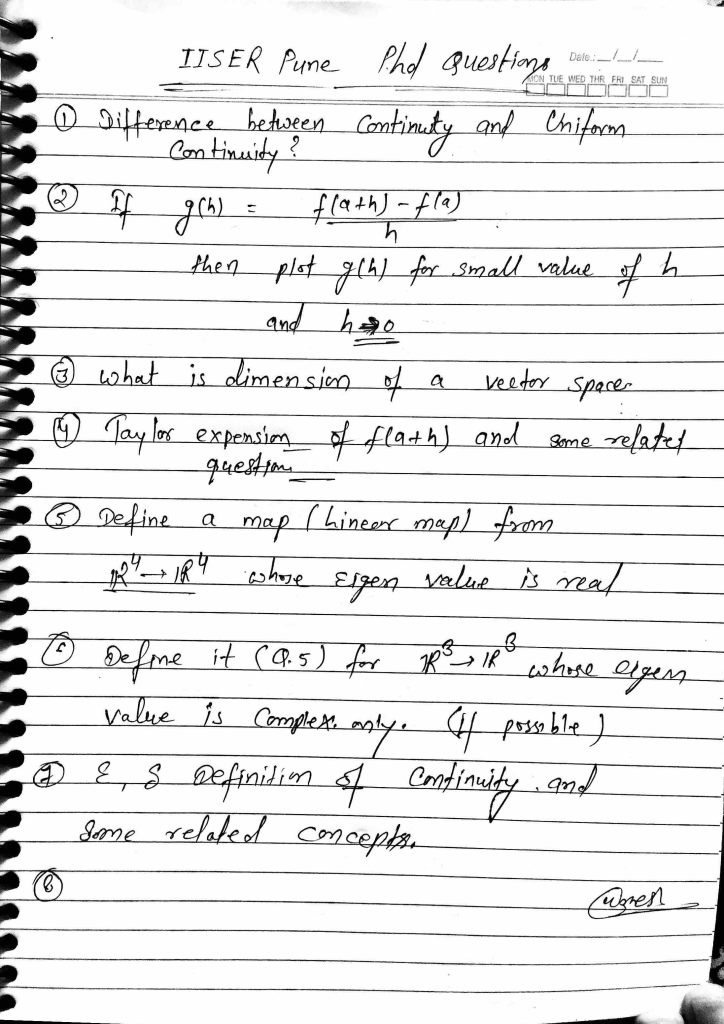
(Added on 04-07-2022)
🎯 PhD Interview/Admission Questions IITB, IITK & IITM (04-07-2022)
(Anonymously Shared)
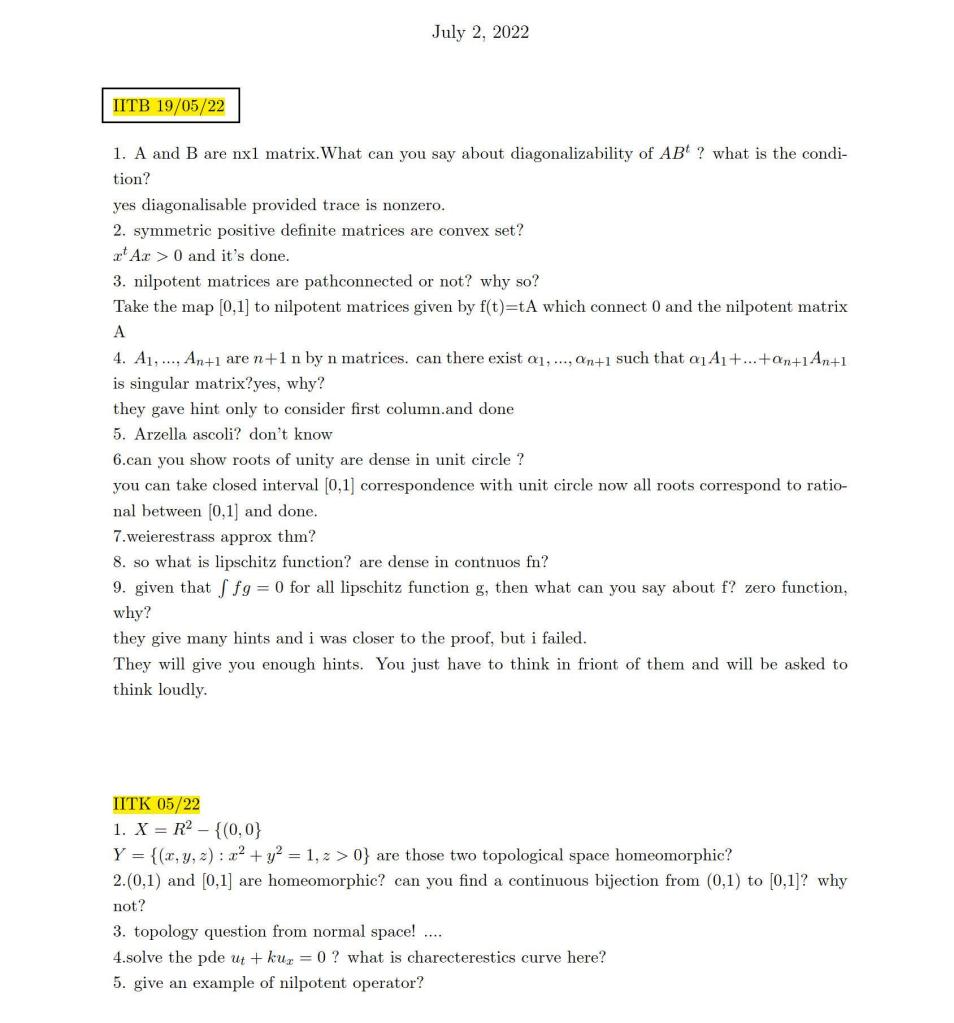
IIT Madras Que.
🎯 Hello, Sir, Sending PhD interview questions of IISER Bhopal, IIT Indore and IIT Hydrabad.
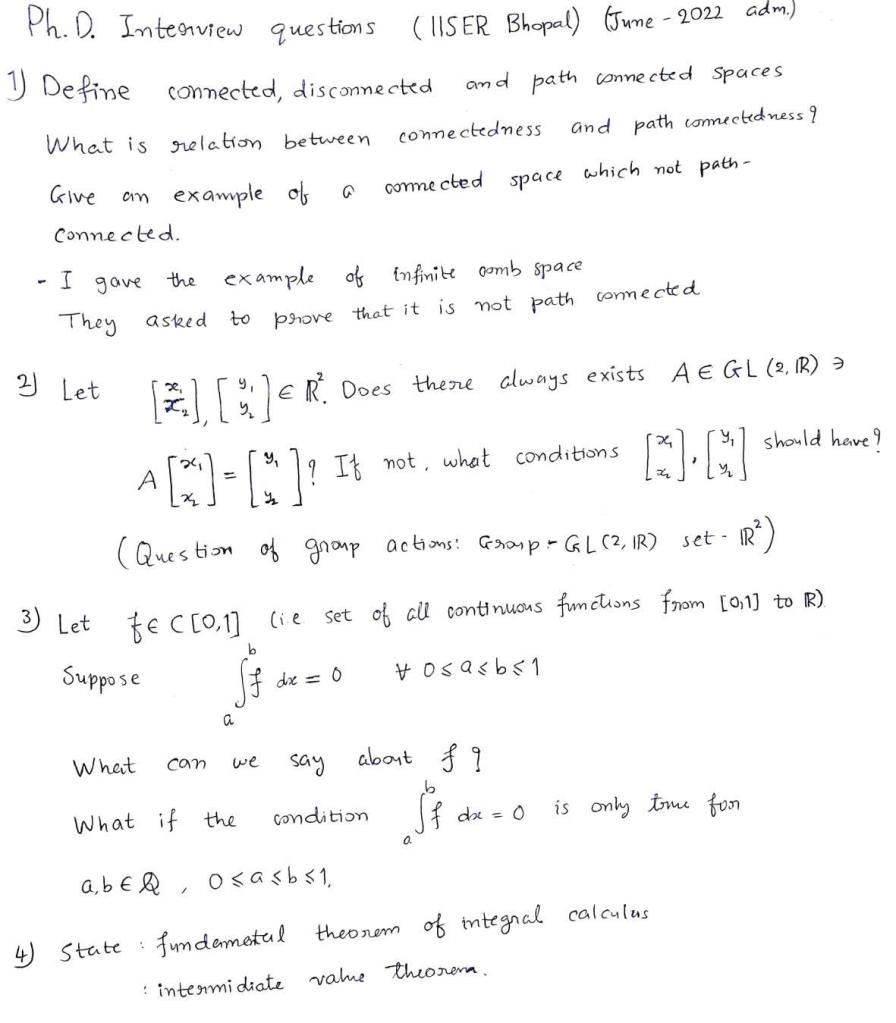
(Added on 28-05-2022)
🎯Hello ! I attended the PhD interview at IIT Dharwad this year. I’m sharing the questions below.
(Anonymous Shared)
- What is the order of A_n ? Prove your claim.
- What group is the quotient Gl_n(R)/Sl_n(R) isomorphic to? What about Gl_n(C)/Sl_n(C) ?
- What group is the quotient M_n(R)/H isomorphic to ? (H is the set of matrices in M_n(R) with trace 0.)
- Let H be the group of all 10th roots of unity under multiplication. What group is the quotient (C*,•)/H isomorphic to?
- G is a finite group such that all its non-identity elements are of order 2. What can you say about G?
- Prove that the additive group of a field of order p^n is isomorphic to Zp × Zp × … × Zp (n times).
- What is the order of Sl_n(Zp) ? Prove it.
- V is a real vector space. f & g are linear functionals on V such that ker(f) ⊂ ker(g). How are f and g related?
🎯 PhD test and interview questions collection shared by Nidhi Shukla, Download the PDF file (17Pages).
SNU PhD test
- The least value of n for which Sn has abelian subgroup of order 30?
- Co-Variance of two random variable lies between 0 and 1?
- How to find connected set if set contains element in the form of matrix?
- A Set containing (x ,y) such that X square + y square is equal to 1 and xy is not equal zero_ compact?
- T is a mapping from V1to V2 where v1 and V2 are finite dimensional vector spaces let S be a subset of V1 then the relationship between dimension of T(S1) and dimension of S1?
- AA’=A’A=I
- =>0for all x
- If a function is given in terms of series then how to find its continuity & Differentiability?
PhD Interview at IITs, IISc, IIPE, etc. Download PDF File: Click here
🎯 TIFR Mumbai PhD Interview April 2022 Questions Shared by Dhiman Das.
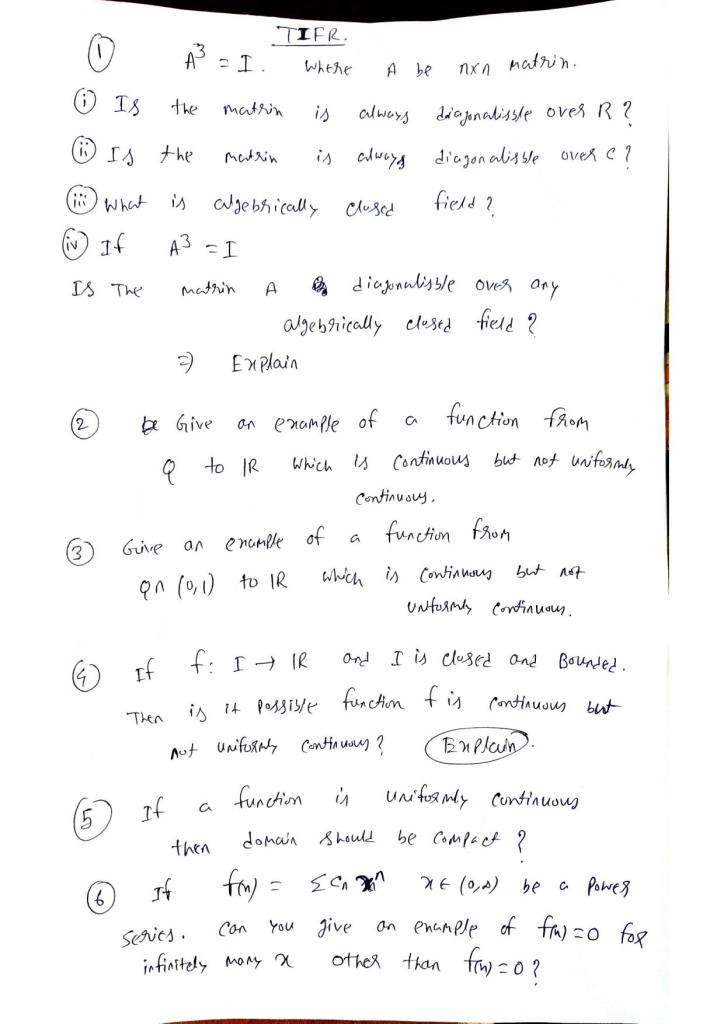
(Added on 07-04-2022)
🎯 Hello Sir, I am selected for PhD at Aligarh Muslim University. I thank you for all the updates and notes and videos. Sharing my interview questions. Pls keep anonymous. Thank you again for running the kalika community.
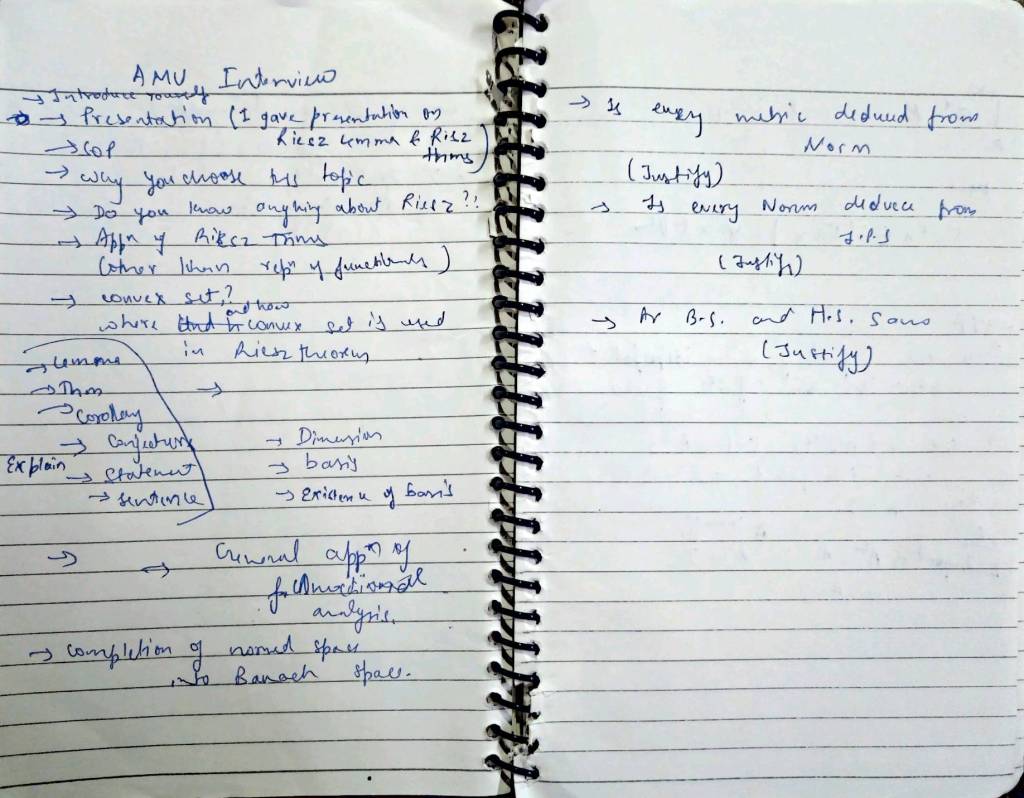
(Added on 30-12-2021)
🎯 PhD Interview 2021 Questions asked at VIT Bhopal
Sir, I have appeared for an Interview for VIT Bhopal on 8th december and also got selected. I am attaching the file of questions here. Also big thanks to you sir as the collections of interview questions is very helpful for me. and also I am following your study material of many topics for preparing for CSIR & GATE. Regards Suneel Kumar
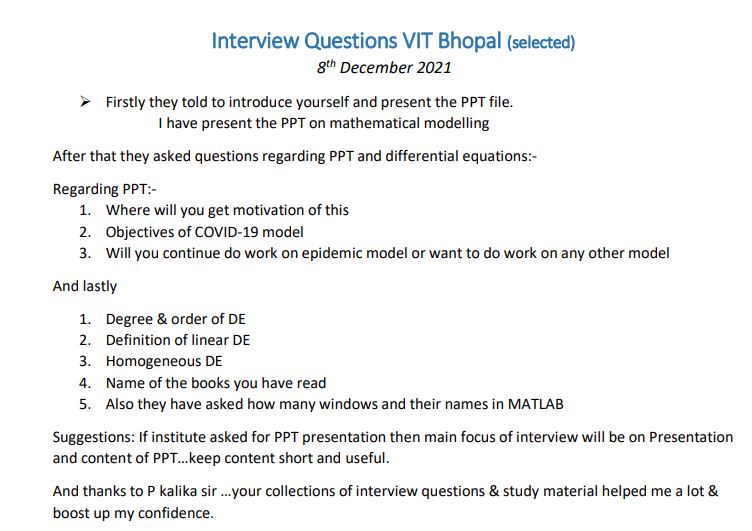
🎯 PhD Interview 2021 Questions asked at UNIVERSITY OF DELHI
Hey, I have given Interview at UNIVERSITY OF DELHI. The interview questions are follows: First we have to make a presentation on any of our favourite topic in not more than 8 minutes. My topic was “Fundamental Theorem of Finite Abelian Groups” The questions asked are as follows: 1) What are elementary divisors? Give an example. 2) Given two finite Abelian Groups G and H. How can we check whether they are isomorphic or not with the help of elementary divisors? 3) What are the future plans that you would like to work with the theorem that you presented? 4) What is the partial converse of Lagrange theorem for Non-Abelian groups that we have from “Fundamental Theorem of Finite Abelian Groups”? 5) How many groups upto isomorphism are there of order 15? 6) What is Cauchy theorem? 7) With the help of Sylow theorem, show that the group of order 15 is Cyclic? 8) Do you know Free Abelian group? 9) What is Commutator group? 10) What are the derived series? 11) With the help of derived series can we define Solvable group? 12) What is Characteristic subgroup? 13) Relation between Characteristic subgroup and Normal subgroup? 14) Why is every characteristic subgroup normal? 15) What is the Commutator subgroup of GL_n(R). Why?
🎯 PhD Interview 2021 Questions asked at IISER MOHALI
Hey, I have given an interview at IISER MOHALI. The questions are as follows: 1) What is the unit group of Z_n? (in terms of n) 2) What are the maximal ideals of Z? (I said of type pZ where p is prime) 3) Prove that Maximal ideals of Z are only of type pZ where p is prime? 4) Consider the complex polynomial ring C[x]. What are its irreducible elements? What are its maximal ideals? 5) Consider C[x,y], what are its maximal ideals? 6) Are the ideals <x-a> and <x-b> in the ring C[x] same? For what condition on ‘a’ and ‘b’ will they be same? 7) Is the space L²[a,b] a Hilbert space? 8) Consider [0,1]. As every point in [0,1] can be written in decimal expansion. Consider the set of all points in [0,1] whose decimal expansion do not include the number 5. What is its measure?
(Added on 17-12-2021)
🎯 VIT VELLORE PhD Interview 2021 Questions
Me Nowshad Ali Mir from Jammu and Kashmir. I have appeared for interview on 20th of Oct, 2021 at VIT VELLORE. INTERVIEWERS asked me simple questions:
- What is Differential Equation?
- what is Order of D.E?
- General Solution
- particular Solution
- Singular Solution
- Complementary function
- Particular Integral
- Can C.F alone can be a solution of D.E?
- Can P.I alone can be a solution of D.E?
- How many arbitrary constants are in General Solution of D.E?
- and some questions about my Research Proposal.
🎯 IIT Kanpur, Madrash, BHU & IISER Berhampur PhD Interview Dec 2021 Questions (Anonymous Share)
(Added on 10-12-2021)
My Name is ———— and I got selected in PhD at IIT Madras for 2022 January session, Here I am attached the following interview questions of mine. Click on the link to read.
🎯 IIT Kanpur PhD Interview December 2021 Questions (Anonymous Share)
- What can we say about group G if its order is 27?
- How many non-abelian groups are up to isomorphism of order 27? What about its center?
- If |G| = p^3(p is prime), show that G has a subgroup of order p^2?
- Let V be a vector space over C and T: V to V is a linear operator such that for v in V there exists n in N(naturals) satisfying T^n (v) = v. What can be said about the linear operator T? [Hint: Show that T is diagonalizable]
🎯 IIT Bombay PhD Interview Dec 2021 Questions (Anonymous Share)
- Consider the polynomial f(x) with rational coefficients, then how many homomorphisms are there from Q[x]/<f(x)> to C which maps 1 to 1?
- Is (Q,+) finitely generated? Explain.
- Consider the function f(z) = 1/(z^2+1). Is the function entire? Why/Why not. Are there any singularities? Classify them.
- Consider f(z) = 1/(z^2+1). What is the radius of convergence for the power series about z=100?
- Give the entire function f such that Re(f(z)) tends to 0 and z tends to infinity.
- What is a Lipschitz function? Is it continuous?
- Is the set of all Lipschitz continuous function on [0,1] dense in C[0,1]?
- Can C[0,1] be approximated by polynomials?
🎯 IIT BHU PhD Interview Dec 2021 Questions (Anonymous Share)
- Consider the 2×2 matrix that rotates each vector by an angle alpha, then what can be said about its eigenvectors?
- Can there be a continuous function f:[a,b] to Q(rationals) ?
(Added on 01-12-2021)
🎯 IIT Kharagpur PhD Interview 2021 Questions (Anonymous Share)
“ Thank you sir for your effort for making us available such questions!”
The interview was for 30 mins. Area of interest: graph theory.
1st 10 mins, they show the 1st 5 questions which I had to solve in 10mins. Next few questions they asked verbally.
Note: These are the memory based questions. Some small differences may be there.
- K_4 is planar?
- What is spanning tree?
- Every graph is tree?
- How can one represent graph in a computer?
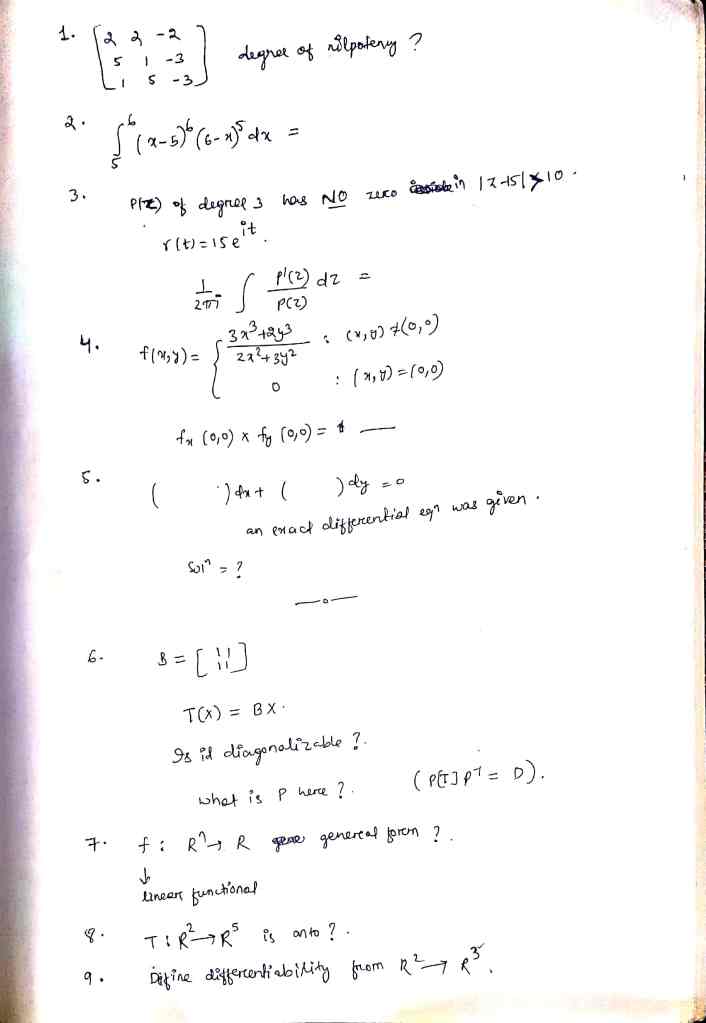
🎯 IISc Banglore PhD Interview 2021 Questions (Anonymous Share)
- Let G be a finite group and G/Z(G) is cyclic then show that G is Abelian.
- Is the series (n=1 to infinity) [2+sin(n)]/n converge?
- If f:[0,1] to R is continuous function and Integral from 0 to 1 f(x) dx = 0. Then, does there exists x in [0,1] such that f(x) = 0 ?
(Added on 24-11-2021)
🎯 NBHM PhD Interview 2021 Questions (Anonymous Share) (This Student got selected in NBHM ).
I am very thankful to Mr. P kalika sir. Your videos helped me a lot.
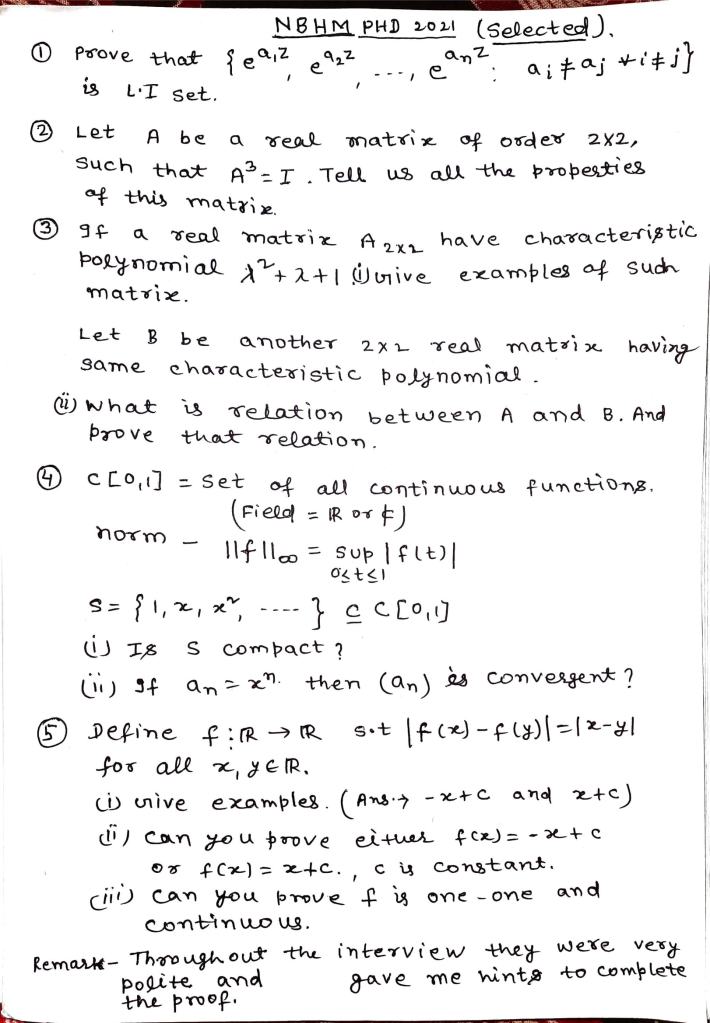
🎯 Interview Questions for PhD Admission at IIT Hyderabad (Anonymous Share).
1) Tell us about your favorite theorem in Linear Algebra. Prove it. Why do you like it? 2) What is the Characteristic Polynomial of a matrix? 3) What is the Rank of the matrix? How do we find it?
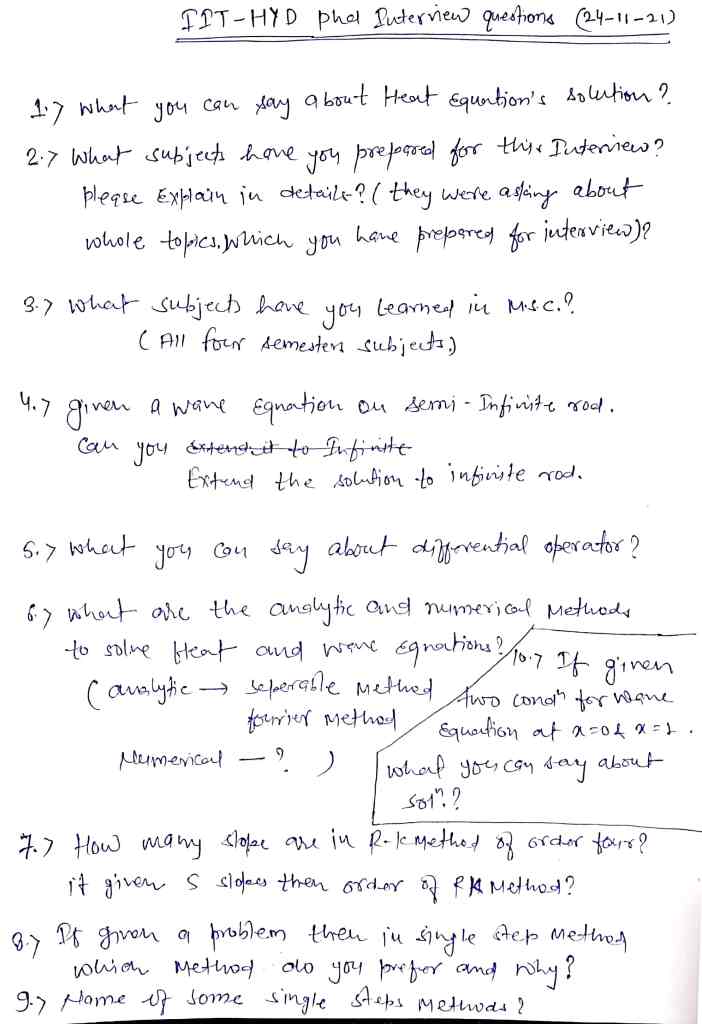
(Added on 19-11-2021)
🎯 Interview Questions for PhD at IIT Jodhpur dated 18-11-2021 (Anonymous Share).
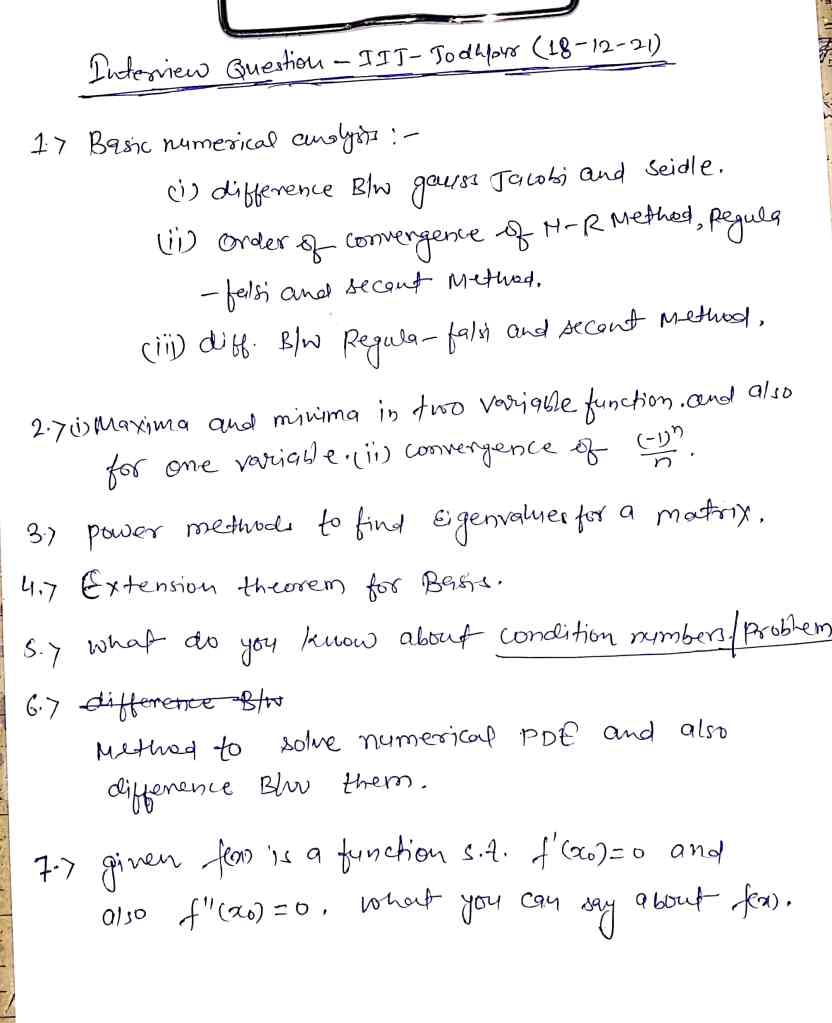
🎯 NBHM PhD Scholarship 2021 Interview Questions (Anonymous Share) (This Student got selected).
(Added on 07-11-2021)
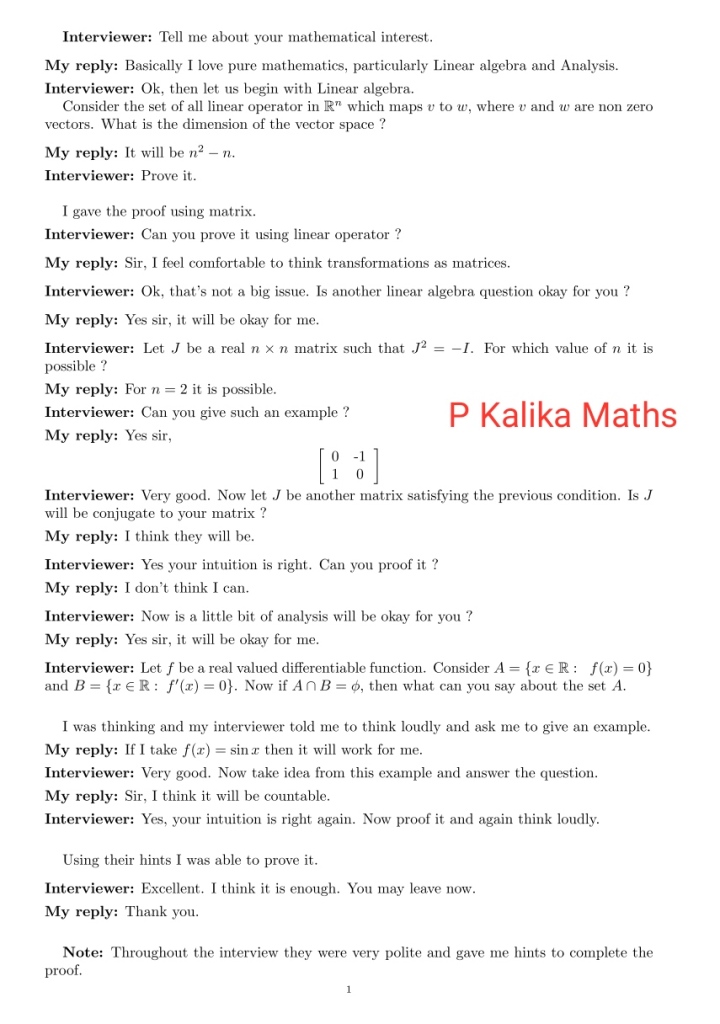
🎯 NBHM Phd Scholarship 2021 Interview & IMSc Phd Admission 2021 Interview Questions (Anonymous Share) (This Student got selected in NBHM ).
(Added on 22-10-2021)
I have appeared for BITS Pilani Interview and have been selected in it as well. I don’t remember the questions, but they were just 3-4 and one of them was what is the Nilpotent Group? Interview was very easy.
I have also appeared for the NBHM Phd Scholarship Interview and have been selected.
The questions are as follows:
- If the order of a group G is >3, then find two automorphisms of G.
- Can we always find a real polynomial f(x) such that f(1) =2 and f(4) =7? What if f(a) = b and f(c) =d (a,b,c,d are all real)? [Hint: Vandermonde Matrix]
- Can we always find a real polynomial f(x,y) such that f(1,2) =2 and f(4,7) =9? What if f(a,b) = c and f(d,e) =f (a,b,c,d,e,f are all real)? [Hint: Chinese Remainder Theorem]
- Given a continuous function f:R to R satisfying f(x+y)=f(x)+f(y). Find f(x). Justify.
I have also appeared for IMSc Phd Interview . The questions are as follows:
- Given a group G, H is an index 3 subgroup of G. Then either H is a normal subgroup or there exists a subgroup N in H which is normal in G and has index 2 in H.
- Suppose {a_n} is a sequence of real numbers, fix L in R(real numbers). Assume that for every subsequence {a_n_k} there exists a further subsequence {a_n_k_p} which converges to L. Show that {a_n} is convergent to L.
- Show that Image of a non-constant entire function is dense in C(complex numbers)?
🎯 Some memory based ques from today’s DUET Mphil/PhD exam. (Shared by Kirandeep Kaur )
(Added on 04-10-2021)
Download PDF
🎯 Hello sir recently I experienced NBHM PhD interview and sending my interview questions here. (Shared by Parna Saha)
(Added on 22-09-2021)
First they asked my preference and I said abstract algebra. Then they asked two questions from the nbhm phd written test. One is prove the formula ” number of idempotent elements in Zn = 2^d” And another one from linear algebra and I answered the question in written exam wrong but still they said to try there… Then they ask
- What is class equation?
- What is the cardinality of center of a group of order 27? Explain it by the help of class equation.
- Number of Homomorphism from S3 to Z6? Explain.
- Let A,B are closed sets in R. Consider the set dist(A,B) defined by {|x-y|:x in A,y in B} = 0 then what can you say about the intersection of the sets A and B.
- One question from topology which I didn’t remember.
Suggestions: If you are appearing nbhm interview try to read the proofs of the formula we generally use and prepare your nbhm exam questions..all of them And whatever your preference can be…they ask question from real analysis and topology.
🎯 I am attaching here pdf of questions asked in PhD interviews at IIT, IIIT, and IISER. These are collection of questions based on my experience of one year (Shared by Divya ).
(Added on 21-09-2021)\
Download PDF shared by Divya: Click Here
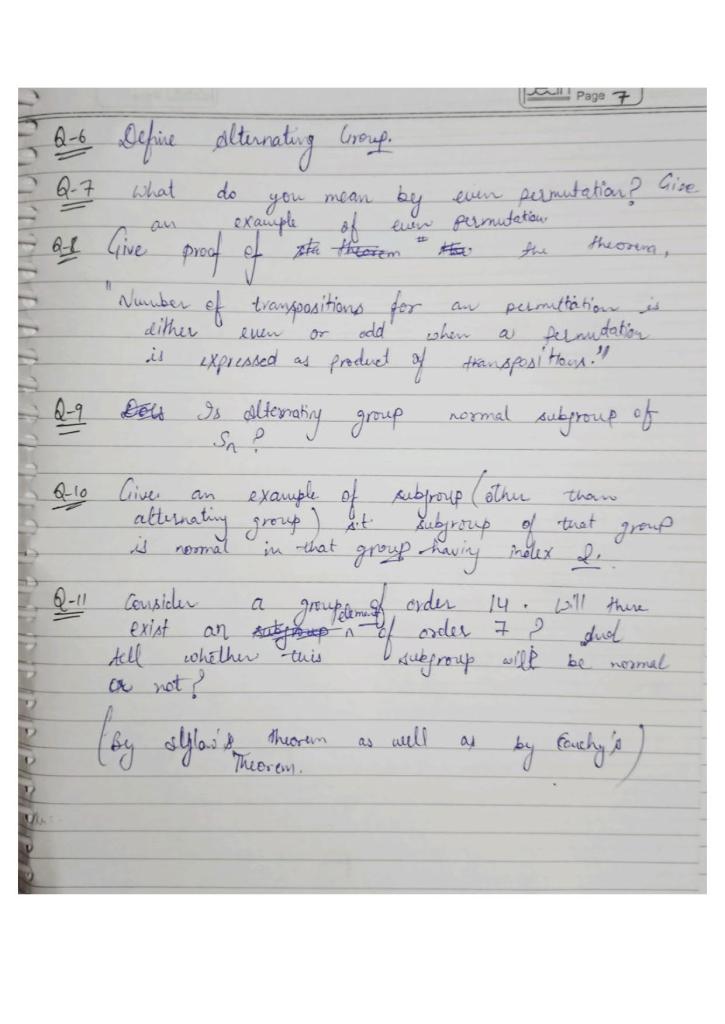
🎯 Hello here is the question of PhD interview University of Calcutta (Ballygunge Science College) pure Mathematics (Shared by Amitabha Bhattacharya )
(Added on 21-09-2021)
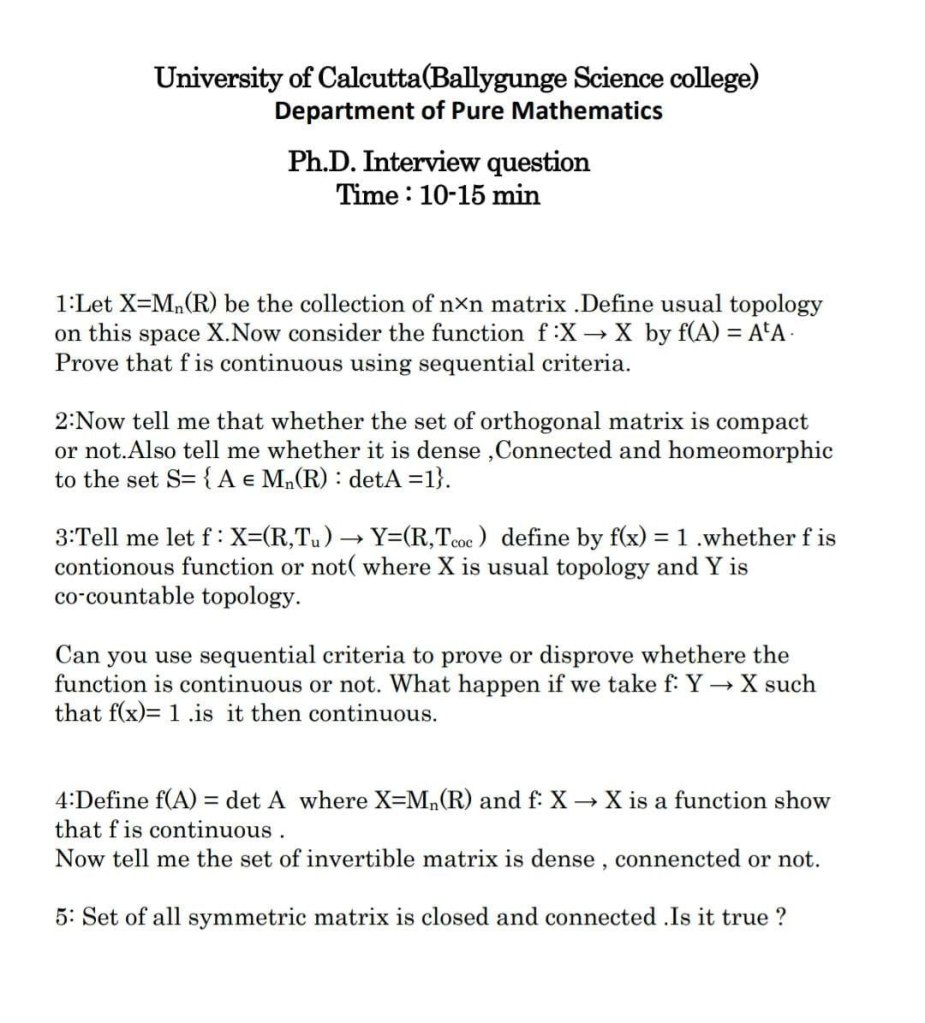
🎯 IISER Mohali PhD Interview 2021 Questions (Anonymous Share)
(Added on 08-08-2021)
- Give some examples of non- commutative rings.
- What are the ideals in the ring M_2(R)?
- Consider a ring R and an ideal I, and if it contains some invertible element. What is special about this ideal?
- Let f: C to C is an analytic function. Let P(z) = a_0 + a_1 z + … + a_n z^n is a n degree polynomial. Also P(f) = 0. What can we say about this function?
- A function function in real is always continuous? If yes then prove. If not then give a counter-example.
- Which type of discontinuities does an increasing function have?
- Do we have any homomorphisms from S_3 to Z_6? Justify.
- Is there a continuous map from [0,1] to (0,1)? Why/Why-not?
- Construct a surjective map from (0,1) to [0,1].
- Construct a bijective map from (0,1) to [0,1].
🎯 IIIT Delhi PhD Interview 2021 Questions (Anonymous Share)
- What is Quotient group? How to define it. What is the equivalence relation here?
- What is a Factor ring?
- Let G/H be a factor group. Why do we require H to be a normal subgroup.
- Give an example of a group G and its non-normal subgroup H such that G/H is not a group.
- What is a Field Extension?
- When do we say a field extension is finite?
- Is every finite field extension algebraic?
- What about the converse? Give a counter-example. Prove it.
- What is an Algebraically Closed Field?
- What is the difference between Algebraic Closure and Algebraically Closed Field?
- Give an example of an Algebraically Closed Field?
- Give an example of a non-Algebraically Closed Field?
- Let p be prime and consider the polynomial 1+x+x^2+…+x^(p-1) over Q. Is it reducible or irreducible. Why
- What is the splitting field of the above polynomial?
- What is a general linear group?
- What is the order of GL(2,Z_p)? How.
🎯 NIT Patna PhD Interview 2021 Questions (Shared by Soubhik Paramanik )
(Added on 31-07-2021)
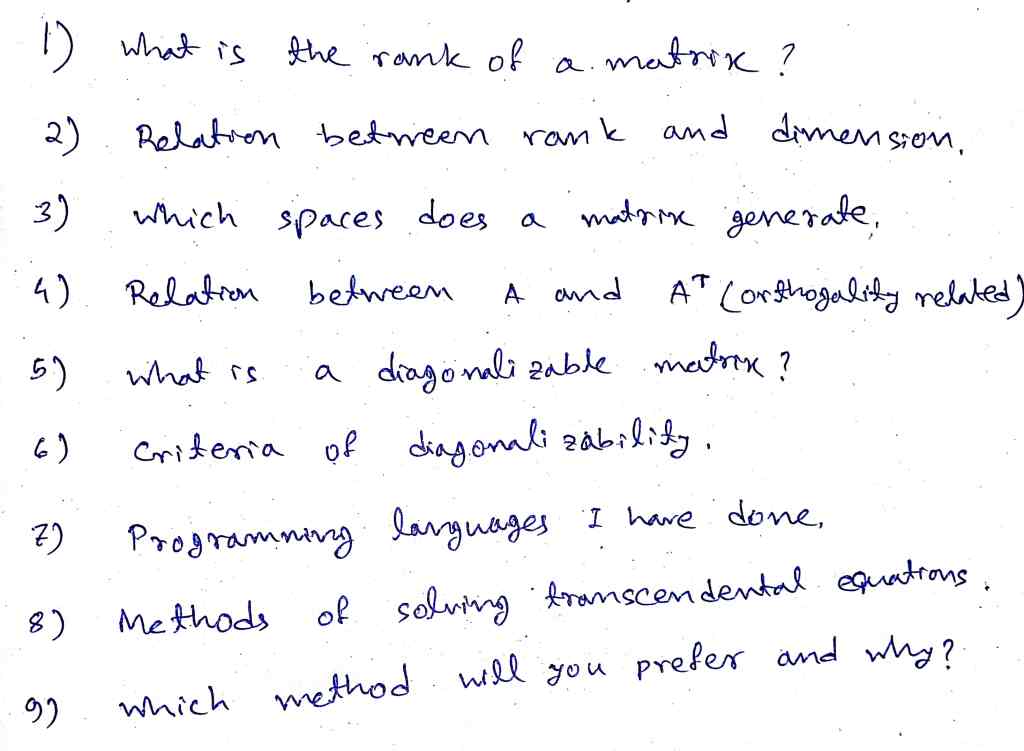
🎯 NIT Allahabad PhD Interview 2021 Questions (Anonymously Shared )
(Added on 26-07-2021)
- State existence and uniqueness theorem
- Define Leibnitz condition
- y’=siny is linear or non linear? Why?
- y’=√y what is it’s degree
- Define regular singular points.
- Is it possible to find series solution using regular singular point.
- Define indical equation
- Value of integration of exp(x²) , limit is from 0 to infinity
- f(x)=x|x| differentiable at x=0 or not , if yes what is the value of f'(0)
- How to find tangent plane of f(x,y,z)=0
- What is equation of plane
🎯 IIT INDORE PhD Interview 2021 Questions (Anonymously Shared )
(Added on 23-06-2021)
- What is dim of R(Q)?
- Why dimension is infinite?
- Any n dimension vector space over Q is countable or not
- f(x) = x sin(1/x) for x≠0, f(x)=0 for x=0Is f(x) continuous ?
- Why limit of sin(1/x) does not exist at x=0 ?
- The given function in que 4 is differentiable or not?
- If the function is continuous then its derivative is continuous?
- f(x) = x² sin(1/x) for x≠0, = 0 for x=0 is continuous. Then it is differentiable. What if we replace x² by x³?
- In general f(x) = x^alpha sin(1/x^beta) for x≠0, = 0 for x=0 Condition on alpha beta for differentiability
- sin(1/x) as x tends to zero range of limit
- What is Sturm Separation Theorem?
- y1=x & y2= sinx then can you form second order differential equation
- V=P5(x) (R) Let set {1,x}Prove it is LI
- v1 & v2 are any two vector in 2 dim plane the line joining point v1 & v2 passing through origin is LI or LD
🎯 IIT Bhubneswar PhD Interview 2021 Questions (Shared by Radhanandan Mandal ).
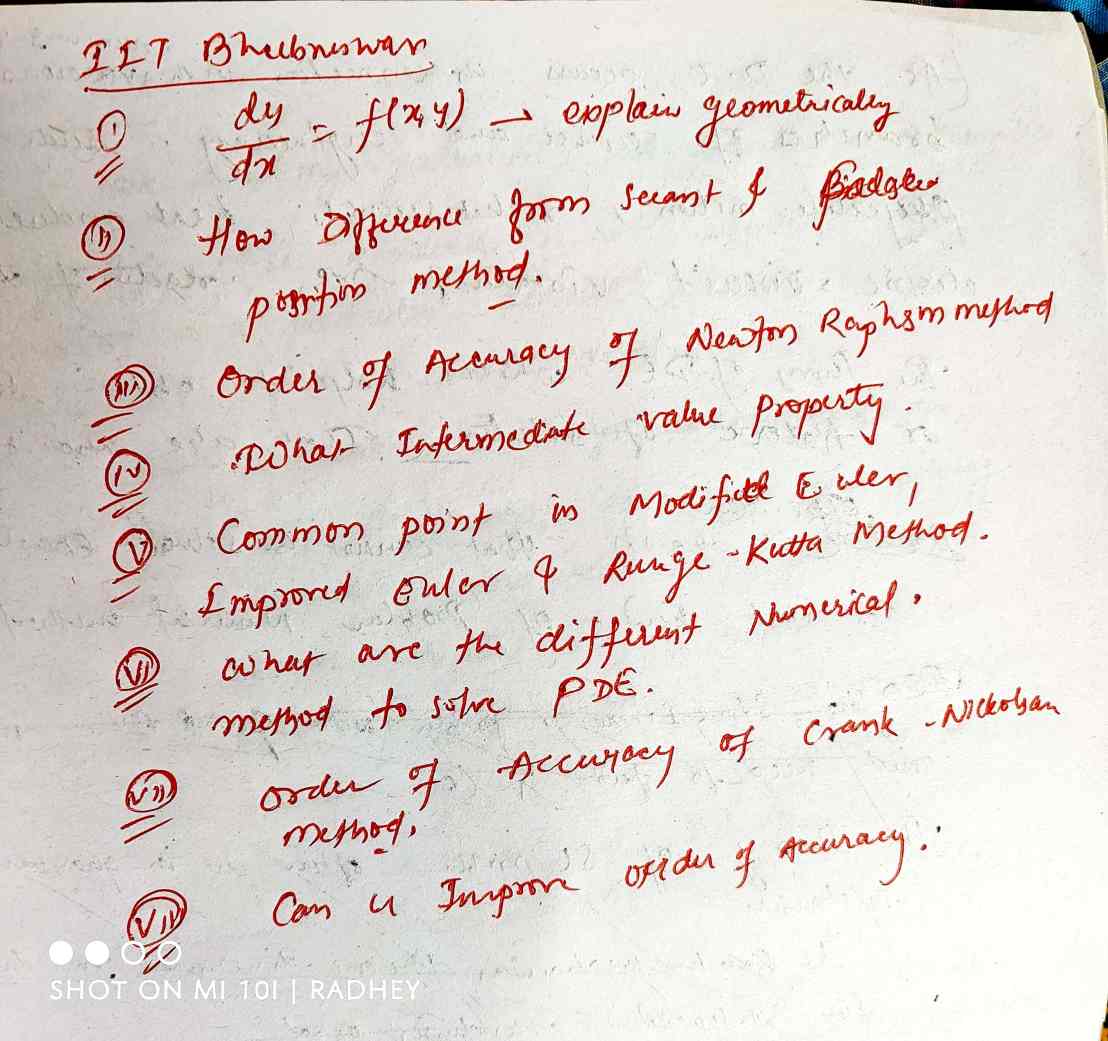
🎯 IIT Jodhpur PhD Interview 2021 Questions (Anony mously Shared )
(Added on 16-06-2021)
- What is Chinese Remainder Theorem
- Application of Chinese Remainder Theorem
- What is Prime Number
- Chinese remainder theorem in Ring Theory
- What is an Irreducible Element
- What you know about set of Integers
- What is relation in Prime element & Irreducible element
🎯 IISc Bangalore PhD Interview 2021 Questions (Thanks to Lalbahadur Sahu )
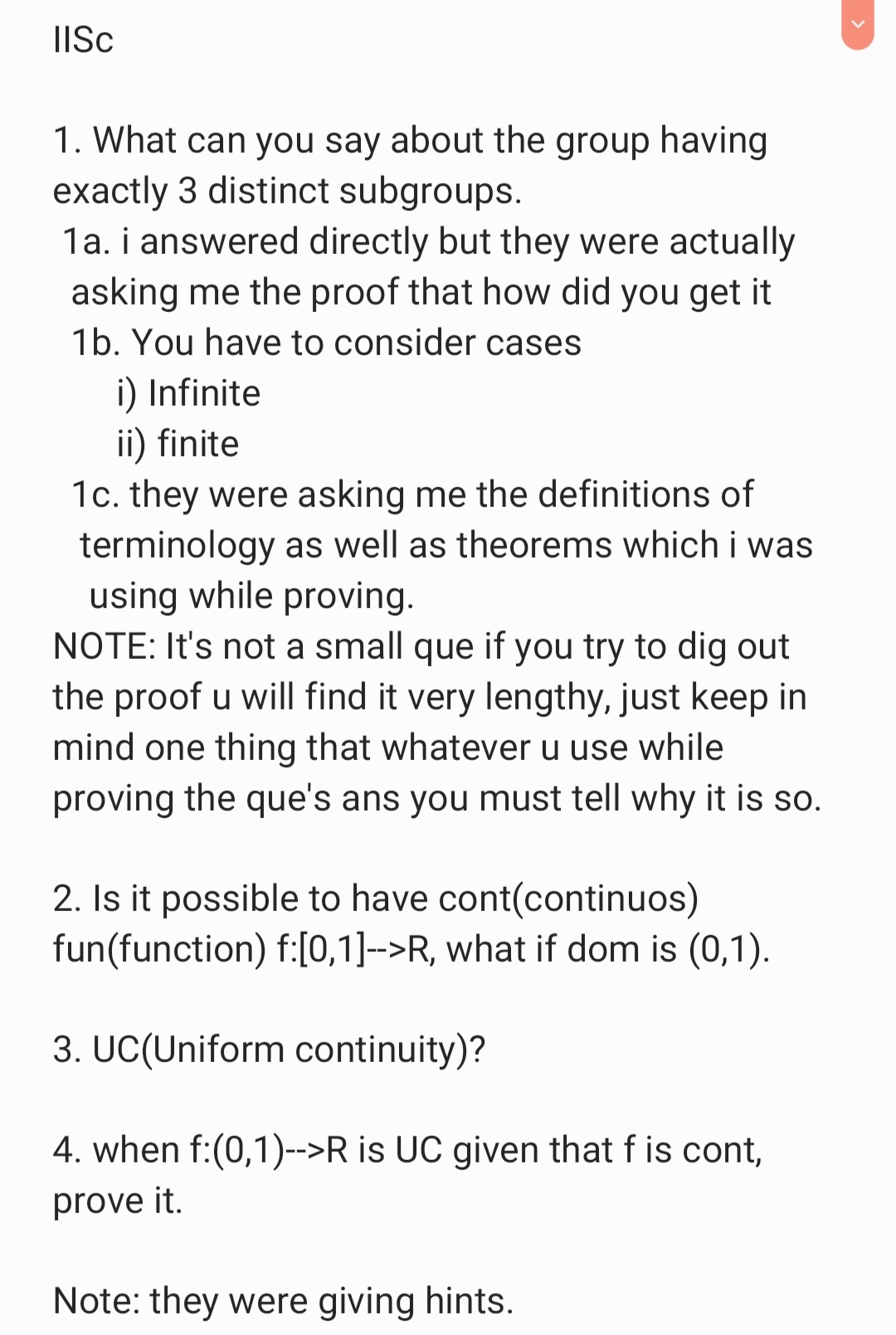
🎯 IIT Mandi PhD Interview 2021 Questions (Anonymously Shared )
(Added on 15-06-2021)
- State and explain existence and uniqueness theorem of ODE.
- What is ODE ? What is PDE ?
- What is order and degree ?
- What is characteristics equations ?
Email Address
Subscribe Us
🎯 IIT Delhi PhD Stage-1 Interview 2021 Questions (Anonymously Shared )
🎯 Anonymously Shared – 1
- Definition of Differentiability
- f(x) = x sin(1/x) for x≠0, = 0 for x=0 is diff. or not. Prove it.
- Definition of continuous function. Give an example of Discontinuous function.
- If A & B are 2×2 matrices such that AB =0 then BA=0 ?
- In above question, if (AB)²=0 what about BA² ?
- In group G if every non identity element has order 2 then is it Abelian group? If yes, Prove it.
- Let G be a group of odd order, F: G to G defined as F(x) = x². Is it a homomorphism? If yes, prove it.
🎯 Anonymously Shared – 2
- Def. Of open ball.
- Def. Of closed ball.
- Def. Of boundary point.
- [0,1] Union [7,9] center 8 and radius 1 boundary point Or isse related kya puch rahe samajh nhi aaya
- Complex se fundamental theorem ka proof.
- Difference between differential function and analytic function.
- Analytic function, singular point, CR equation, types of singularity, examples of isolated singularity.
- df/dzbaar = 0 wala result proof kro
🎯 Anonymously Shared – 3
- If a subring of a ring is integral domain, does it imply Ring is also an integral domain?
- Definition of Integral domain.
- A given n×n non invertible matrix will be a zero divisor or not?
- Is S a subgroup of G?
- Is S a normal subgroup of G
- Def of similar matrices
- does there exist some infinite group having only finite no. Of subgroups?
- There are infinitely many prime numbers. Proof.
- If f is non negative continuous function such that [integral (0to1) fdx]=0
- Then what can u conclude about f?
- √x is Uc. Why so?
🎯 Anonymously Shared – 4
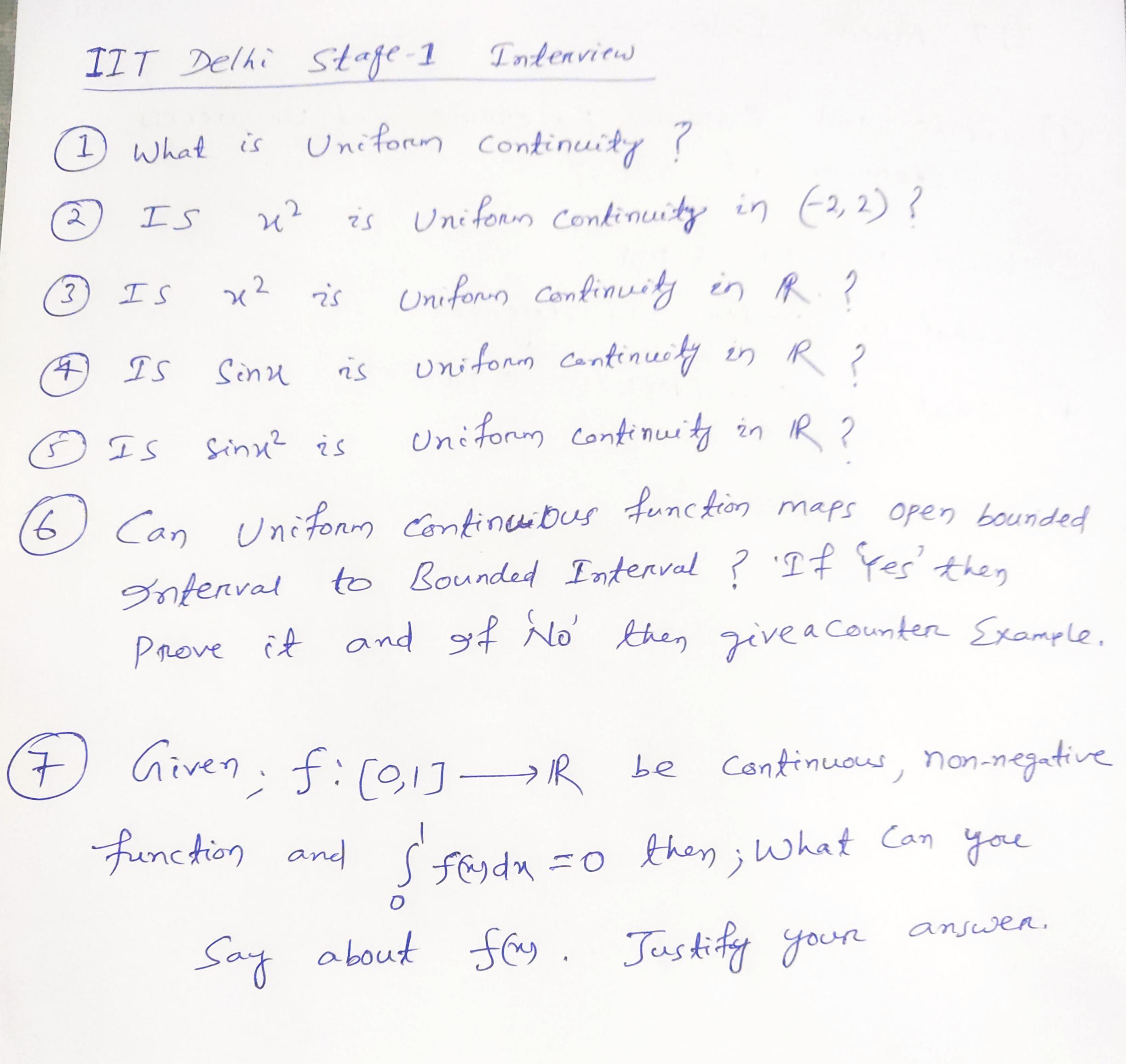
🎯 Interview Questions for PhD Admission 2021 at IISc Bangalore ( Shared By Sayan Roy )
(Added on 12-06-2021)
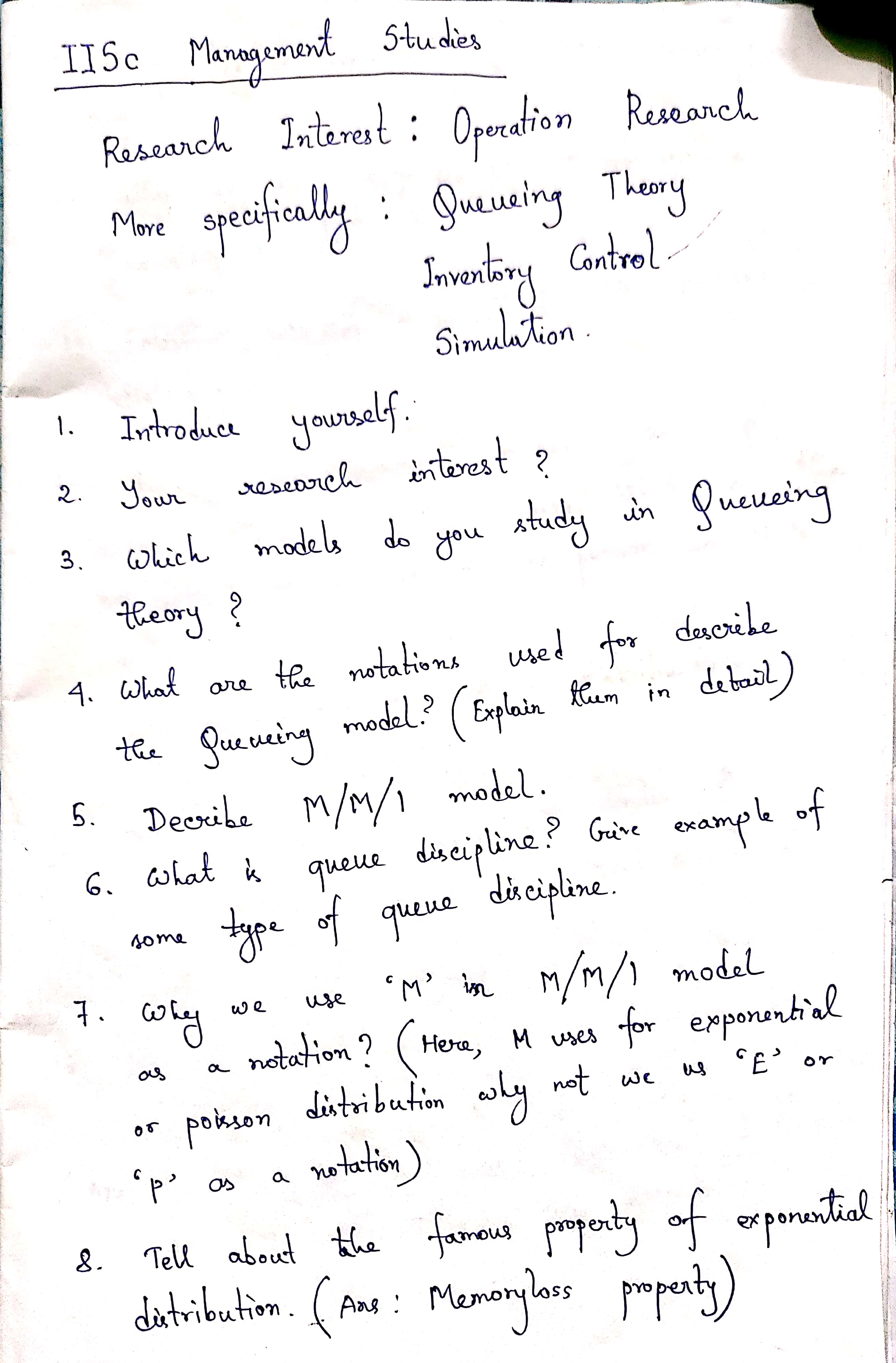
🎯 Interview Questions for PhD Admission 2021 at IIT Hyderabad (Anonymously Shared )
(Added on 11-06-2021)
I have given an online PhD Interview for IIT Hyderabad. The questions are as follows:
- Is the collection of all polynomials of degree at most 2 over the field of reals a vector space?
- Now the function that p(x) goes to its derivative, is it a Linear Transformation?
- Give its Matrix Representation.
- Is the matrix diagonalizable? Why/Why not?
- Prove that a Nilpotent matrix is diagonalizable if and only if it is a zero matrix.
- Give examples of 2000 (or infinitely) rings.
- Give infinite examples of fields of characteristic 0.
- Give infinite examples of Galois extensions.
- What is the degree of a field extension?
- What is the degree of the extension Q(w_n) over Q, where w_n is n-th root of unity.
🎯 Interview Questions for PhD Admission 2021 at IISER Kolkat a (Anonymously Shared )
(Added on 10-06-2021)
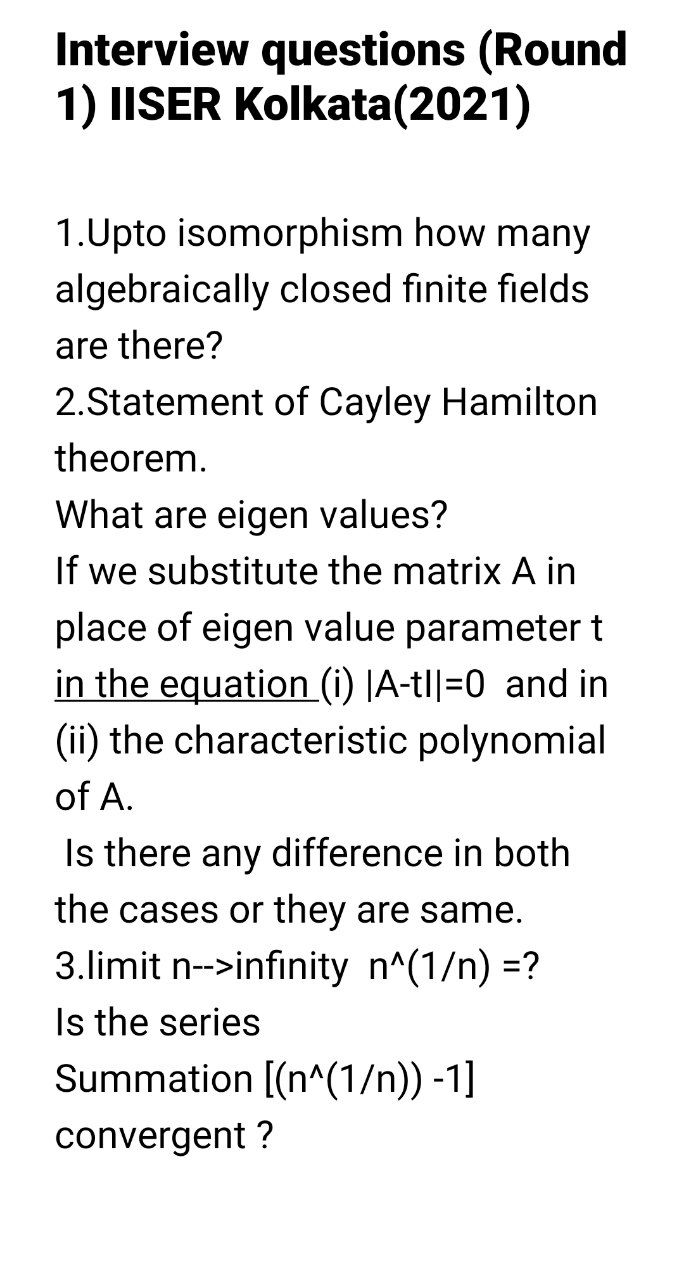
🎯 PhD Admission 2021 IIT Delhi interview quest ion… ( Shared by Sandeep )
(Added on 09-06-2021)
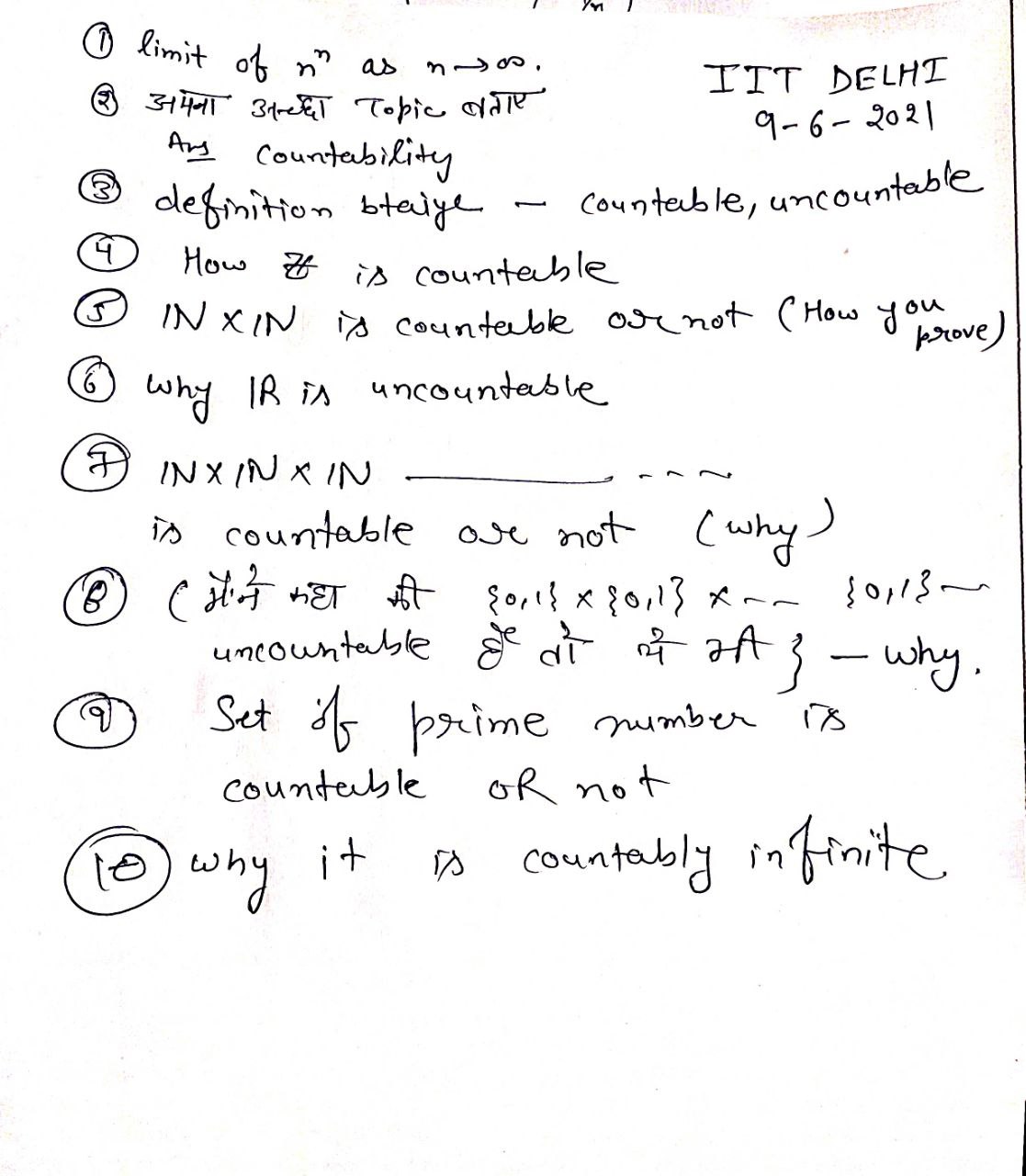
🎯 PhD Admission 2021 IISER Kolkata telephonic interview questio n… (Anonymously Shared )
(Added on 08-06-2021)
- How many finite algebraically closed fields are there upto isomorphism?
- how many fields of order 12 are there upto isomorphism?
- what is caley hamilton theorem?
- how can we represent all those primes which are of the form -sum of 2 integer.
- series (n^1/n -1) is convergent or divergent.
- series (n/(n+1))^(1/n) convergent or divergent. ?
🎯 PhD Admission 2021 Interview Que. Asked at IIT Mandi ( Shared by Dhiman Das )
(Added on 28-05-2021)
● sir maine linear algebra and pde mai interview diya
◆ linear algebra se eigen vector defination
◆ null vector eigen vector ho sakta hai kiya ??
◆ diagonalisibility se and A*A’ diagonalisble or not ase question kiyaa
◆ pde se classifiacation se kuch question kiya
◆ and heat wave de almbert se question kiya sir
🎯 PhD Admission 2021 interview Que. Asked at IIT Kharagpur (Anonymously Shared )
- Expand f(z)=1/z(z-2) by Laurent series expansion in the domain 0<|z|<2 and 2<|z|<infinity.
- How do these two series differ?
- What are different iterative methods for solving system of equations?
- How is Gauss Jacobi method different from Gauss Seidel method?
- Which of the above has better convergence?
- When does the Gauss Jacobi method converges?
- What is meaning of diagonally dominant matrix?
- Is a diagonally dominant matrix invertibe?
- Is the function f(x)=x^2-y^2 harmonic?
📚 (Suggestion) 👉🏻 Questions asked are easy so one has to be clear about all fundamentals while preparing for interview.
🎯 PhD Admission 2021 interview Que. Asked at IISc Banglore ( Shared By Sandip )
One of my friends give interview(today) in iisc bangalore for integrated phd..
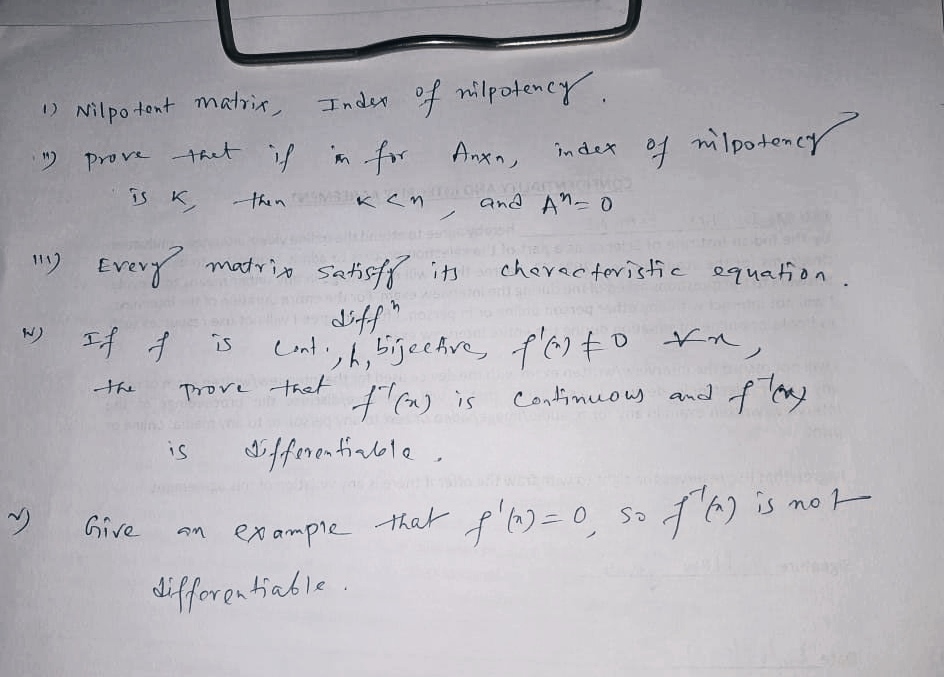
🎯 PhD interview questions Asked at IIT Mandi ( Shared by Manisha Agarwal)
(Added on 25-05-2021)
- Definitions of field, ring, vector space, field extension, linear transformation
- Application of field and field extension
- Collection of all polynomial form a vector space or not?
- Collection of all polynomial of degree greater than or equal to n is subspace or not?
- Collection of all polynomial of deg less than or equal to n form subspace or not?
- If subspace then give any linear transformation on this.
📚 Their Suggestions…
Sir please try to cover latex and mtlab computer applications which we require in phd interview…try to cover as soon as possible.
As they ask that do u know any computer applications like latex and matlab I think it is also one of the factor so that anyone got selection or not
🎯 PhD interview questions Asked at IIT Guwahati (Topic: Real Analysis) ( Shared by Harinand Singh)
- Sequence of function x^n [0, 1] uniform cgt Or not.
- Above question on [0, 1)
- Examples of continus function
- Range of polynomial
- Example of a nonconstant poly which
- Rang is bdd.
📚 Their Suggestions …
This was my first interview, According to me, jisme intersted h us topic ko ache se taiyar kre aur basic bhi. Maine unhe ode bola but O bole kisi aur me interested h to maine real bola O bs real se hi Sare question puche aur thodi bahut help bhi krte h
🎯 PhD Interview Questions Asked at IIT Mandi (Topic: PDE ,& ODE ) ( Shared by Shadhank )
I have appeared in IIT Mandi PhD interview.
The questions were from topic PDE & ODE. The questions were as follows:
- Classify second order PDE with examples of each one? Which type of PDE is classified in these categories (Hyperbolic, Parabolic & Elliptic)?
- From where the Characteristic Equation comes in such PDE and on the basis of roots of which how we decide the above classification?
- Classify the homogeneous Laplace Equation in two dimension. (which is also a second order PDE)
- What is degree and order of a differential equation?
- What is Initial Value Problem? Why it is called as IVP? Is IVP holds for the differential equation having order greater than one? (Discuss)
- What is Boundary Value Problem?
- What are the boundary conditions and how many types of boundary conditions are there? How it it different from Initial Condition?
- What is Sturm-Liouville’s Problem? Is it regular or not?
- How many types of BVP? What is regular BVP?
- Is Heat equation in one dimension an IVP or BVP?
🎯 Some of the PhD Interview Questions that were asked to me in the academic year 2020-2021. The interviews were held online ( Anonymously Shared )
(Added on 10-05-2021)
Interview Questions in IIT Delhi.(Round 1)
- Give an example of an ode such that f(x,y) does not satisfy the Lipschitz’ condition, but still a solution exists.
- What is the most important theorem on finite groups? State and sketch the proof.
- State Sylow’s Second Theorem.
- If the Correspondence (aH)(bH)=(abH) defines the binary operation on the Set of distinct left cosets of H in G. Is H a normal subgroup in G?
- What was the need of an orthonormal basis, when we already had a standard ordered basis?
Interview Questions in IISER Kolkata.(Round 1: Telephonic)
- Prove that R is a field if and only if R[x] is a P.I.D.
- Does R/p become an integral domain if we have only R as a commutative ring without unity and p a prime ideal in R.?
- Give an explicit form of the prime ideals in the ring Z*Z.
- If R is a ring such that every subring in R is an ideal in R, prove that R is either isomorphic to Z or isomorphic to Z/nZ.
- Does there exist a non-commutative ring of order 15?
Interview Questions in IISER Kolkata.(Round 2: Google Meet)
- Is every complex matrix diagonalizable?
- Prove that rank(A*A)=rank(A).
- Relation between the minimal and characteristic polynomial of similar matrices.
- If G and H are Abelian groups, M and N are their subgroups respectively, such that G is isomorphic to H, M is isomorphic to N, then is G/M isomorphic to G/N?
- Let f be an onto ring homomorphism from a PID R to an Integral domain S, such that f is not injective, prove that S is a field.
- what is the dimension of R[x,y]/<x^3,y^2> as a vector space over R?
- How many irreducible polynomials are there in Z_2[x]?
- Show that in a finite group of odd order every element has a unique square root.
- Prove that the image of a non constant entire function is dense in C.
🎯 This Interview Experience is Shared by Gautam Kaushik (PhD Aspirant 2021 ).
🔢 PhD Interview Questions Shared by ‘Ritika Das’ (PhD Aspirant 2021 ).
Interview Questions Asked at Visva Bharati University , Kolkata .
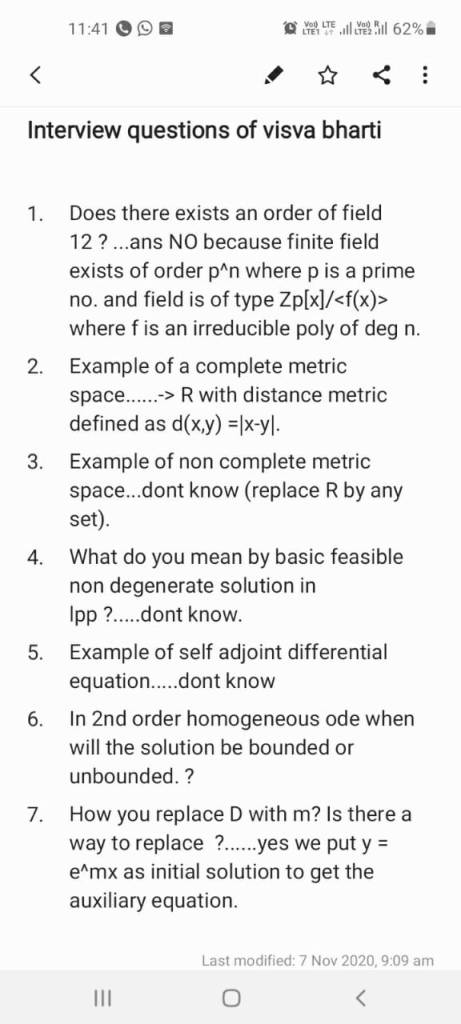
🎯 PhD Interview Questions & Suggestions Shared by ‘Prince Bharti’ (PhD Aspirant 2021 ).
I admitted PhD in January 2021 session at Hyderabad Central University.
I selected subjects for interview namely Differential equations and Fuzzy Theory. Because I do project in MPhil on Fuzzy Theory so it’s beneficial for me. They ask some questions about my project.
And from Differential equations they ask from SLP and BVP , what is the difference between them, and example of these, and knowledge about boundary conditions that’s it.
Thank you sir 🙏
📚 (Our Question) Any Suggestions from your Side…
Yes sir according to me , interview k liye apna ek subject tyyar kr ke jana chahiye, or uske main main topics per command ho and given conditions , related examples ko dhyan se smajhna kafi halpful rhega. Jiska nhi pta use dheere se sorry bol de or apni pasand ka topic unhe bta do bss , ab aap tyyar rhe sb kuch usi me se poocha jane wala h😊😊 that’s it. Thank you sir.
Ye bhi add kr lena, aapke notes kafi useful rhe mere addmission m , thank you very much sir 🙏 , isi tarah se hmari help krte rhiye …
🎯 PhD Interview Questions & Suggestions Shared by ‘Sanket’ (PhD Aspirant 2021 ).
Recently I’ve appeared for VIT Vellore and BITS Pilani interview. Here I’m providing my Interview Questions in handwritten format…
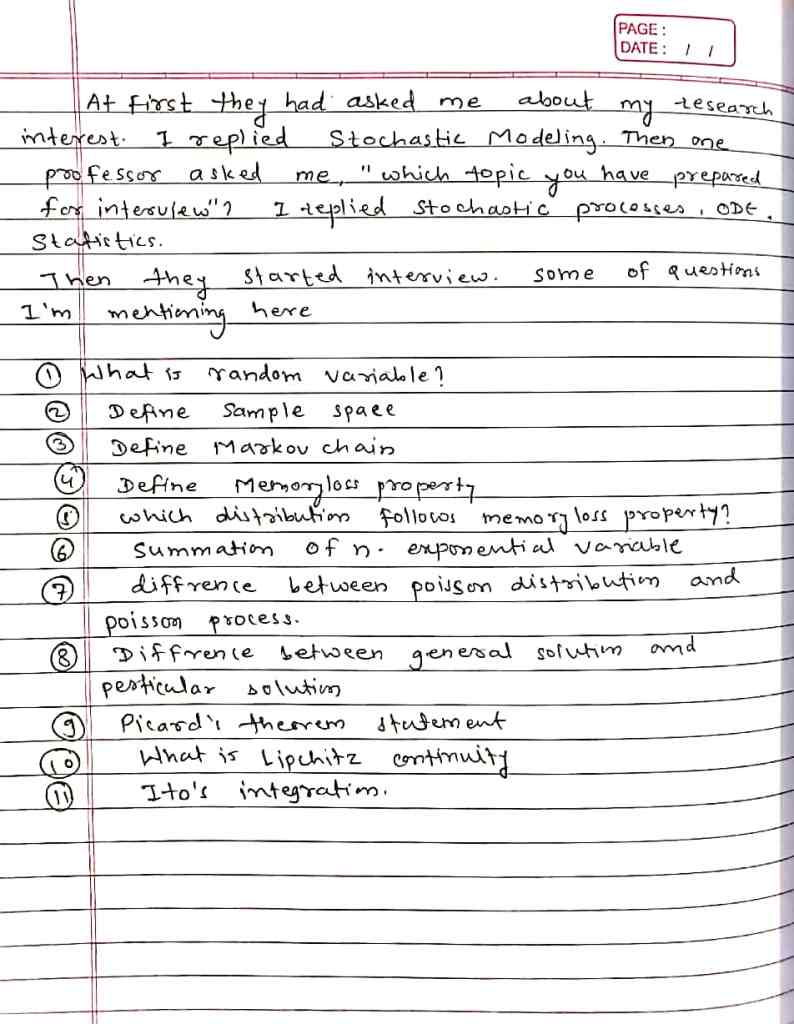
” Just prepare some basics … Means whatever you are going to tell about research interests. Prepare basics nicely. Prepare one favourite theorem. Lots of example and counter examples”
🎯 PhD Interview Questions & Suggestions Shared by ‘Sanjeev ‘ (PhD Aspirant 2021 ).
Hello sir I was asked few questions in Tezpur Univ phd interview
- Shift operators
- Formula for Sequence of rationals that converges to a given irrational c
- Difference between hamel and schauder bases and benefits or need of schauder basis
- Idea of Cantor’s set and its prop and proof sketch of some of the prop
- Basic on group theory
Thank you very much for providing useful tips and updating us on events happening in Mathematical world.
Hello Sir…my suggestions are One may clear the competitive exams but clearing interview is completely different. We need to have good knowledge of topics. Must read standard books (including proofs) like Bartle for Analysis, Gallian for Algebra, etc. Avoid random guess because one wrong answer would expose all your weaknesses. If you don’t know the answer them simply say I can try try and after try if could not get answer then say that you don’t know the answer… Logical implications must be sound.
Note: This page is under construction…
Related Links:
Share this:, 8 thoughts on “ phd & jrf position interview asked questions & experiences(collections) ”.
Thanks a lot sir, but i have seen very less question about many IITs, like IIT Roorkee
Because many of you usually not share the asked question.
very very very nice and hepfull page
Q Is there collection of the DU PHD Interview questions?
Whether any computer science related questions for phd
Thanks a lot sir. 🙏
I need to get new updates
Leave a comment Cancel reply
This site uses Akismet to reduce spam. Learn how your comment data is processed .

- Already have a WordPress.com account? Log in now.
- Subscribe Subscribed
- Copy shortlink
- Report this content
- View post in Reader
- Manage subscriptions
- Collapse this bar
Experiences at an PhD interview at IISc Bangalore
Neeraj Singh Bhauryal
This is the record of my interview at IISc Bangalore for Integrated PhD program in Mathematics which took place on 28th May. So I was called at 2pm there and since I was 10th on the list my turn came at 6pm , I was little nervous and excited too. So the panel comprised of 5 Professors Prof Gautam Bharali , Prof Basudeb Datta, Prof E.K Narayan, Prof Dilip Patil, Prof Pooja Singla
Prof N- Welcome Neeraj , how do you pronounce your last name?
I- Sir it’s Bhawwr-yaal.
Prof G.B- So Neeraj you completed your BSc last year and we don’t have any record of yours from last year of what you’ve been doing, so would you please tell about that?
I- Sir currently I’m enrolled in Int-PhD program at IISER Mohali and I’ve just finished 1st year of M.S there.
Prof B-So why do you want to leave there?
I- Sir I’m interested in Analysis and I think that IISc Bangalore is the best option for me.
Prof G.B – So what courses have you done there?
I- Sir I’m not comfortable with the courses I’ve done.
Prof G.B- I think I just asked you a simple question?
I-( named all the courses from 1st year)
Prof G.B- So what are you really interested in?
I- Analysis.
(Profs started discussing amongst themselves on which topic to start, and finally decided to start Analysis itself)
Prof G.B – I think you must have seen it before but still can you tell whether the series $ sum frac{1}{nln n}$ converges or not?
I- ( I knew the general result that for $ p>1$ the series $ sum frac{1}{n(ln n)^p}$ converges) Sir it will diverge using integral test ( Then I showed that it satisfies all hypothesis required and thus divergent)
Prof G.B- Can you prove the Integral test? Just give me the idea how it’s done.
I- ( Luckily I had done its proof while preparing for TIFR’s interview, drew the diagram and explained the details roughly)
Prof G.B- very good.
( This made me more confident)
(Then they were discussing amongst themselves on which topic shall they ask next, then they decided to come back on Analysis after sometime and started Group Theory)
Prof P- Can you write some groups?
I- ( I got careful not to write any group which can get me in trouble as I knew next they are going to make out problems from them, wrote $ (mathbb{R},+), (mathbb{Q}setminus{0}, . ), (mathbb{Z},+))$
Prof P- You wrote all abelian groups , write some non-abelian groups!
I-( For 10 secs I couldn’t remember any non-abelian group, thoughts were coming in my mind like <em>paani main doob mar beta IISc ka interview hai aur non-abelian groups ni pata</em>!), then wrote $ S_n,D_n$.
Prof P- Okay so is $ (mathbb{Q}setminus{0}, . )$ cyclic?
I-( thought for a while ) It won’t be cyclic since it has exactly two elements $ 1,-1$ of finite order while $ (mathbb{Z},+)$ have only one element of finite order so that they both can’t be isomorphic.
Prof B- Okay then is $ (mathbb{Q}^{+}, . )$( group of positive rationals wrt multiplication) cyclic?
I- ( thought for a while ) it can’t have generator of the type $ frac{1}{q}$ for any $ q in mathbb{Q}$ since then it won’t generate elements of the type $ frac{p}{q}$.
Prof B- So you mean $ (mathbb{Q}^{+}, . )$is not generated by $ frac{1}{q}$ but it may have generator of the type $ frac{p}{q}$.
I- Then it won’t be able to generate elements of the type $ frac{1}{q}$
Prof P- Okay, can you give finite proper subgroup of $ (mathbb{Q}^{+}, . )$?
I- There won’t be any since any non identity element in the group will have infinite order and so cyclic group generated by that element won’t fit inside the finite subgroup.
Prof G.B- (smiles) But isn’t there always a finite subgroup for any group?
I- Yes sir the identity group!
Prof P- And what about $ (mathbb{R}^{+}, . )$ ?
I- Mam, same reason as above , it won’t have any finite subgroups except the identity group.
Prof P- Is $ (mathbb{R}^{+}, . )$ and $ (mathbb{R}, +)$ isomorphic?
I- Yes , the exponential map will work.
Prop B-Let’s come back to Analysis now, can you give a continuous onto map between $ (0,1)$ and $ (-1,1)$?
I- yes, $ f(x)= sin 2pi x$ will work.
( They agreed with that and were discussing that the thing they wanted to ask next will not work now!)
Prop N- What’s the value of $ f(frac{1}{4})$
Prof N- So this example wont’s work since 1 is not in the co-domain.
I-( then I just drew the line joining the points $ (0,-1)$ and $ (1,1)$).
Prof B- Write down the function.
I- $ f(x)=2x-1$
Prof B- So you’re first stretching the interval and then pushing it back.
I- yes sir ( this idea came in my mind initially but I was not getting the function and then wrote $ f(x)=sin 2pi x$)
Prof B- Now can you give an example of continuous onto function from $ [0,1)$ to $ (-1,1)$
I- ( I tried to find some function explicitly for few minutes but failed ) Sir can I draw?
Prof B- yes you can , otherwise it is tough to write down the formula.
( I was drawing something inside the rectangle $ x=0,x=1,y=-1,y=1$, but was not able to draw the required one)
Prof B-At least start somewhere at $ x=0$.
I- So finally I drew a function starting from $ (0,0)$ and monotone function like $ sin x$ which is increasing its magnitude steadily as x increases and tending to touch both +1,-1 but actually not touching them.
( Post interview my friend Soutrik gave an example $ f(x)= x^2sin frac{1}{1-x}$ which really works , the similar graph I had drawn)
Prof B- So now can you prove that this type of function cannot be one-one?
I-(After thinking for sometime) Sir if this function is one-one then since it is continuous it will be strictly monotone and thus wherever we start at $ x=0, f(x)$ won’t able to take values below $ f(0)$ and so it cannot be onto,but this is a contradiction since $ f$ is given onto!
Prof B- Okay but for that you need to prove that one-one continuous function must be strictly monotone.
I-( I did this theorem day before interview, but I was not much confident whether I remember that one!) yes sir I can prove that.
Prof B- Okay the same idea in that prove works here also so try to use that idea.
(After some time he gave me a hint that use ‘Intermediate Value Property’)
I-( I was getting closer but not to the point)
Prof B- what if $ f(0)=0$?
I- ( then I realised how it has to be done) okay so since it is onto it will take both positive and negative values and so $ exists cneq 0$ st $ f(c)=0$ , so that $ f$ is not one-one and similar it can be done for any value of $ f(0)$.
Prof B – Yes!
Prof N- Let $ f(x):S^{1}to mathbb{R}$ be continuous function ,prove that it can’t be one-one or precisely prove that $ exists xin S^{1} $ such that $ f(x)=f(-x)$
I- ( I had no idea for this one)
Prof N- I hope you’ve done some topology?
I- Yes sir.
(After a while)
Prof N- let me give you a hint, consider the function $ g(x)=f(x)-f(-x)$
I- ( still not getting anything!) Sir , I think we’ll have to make use of Intermediate value property.
Prof G.B- IVP is valid for intervals not for $ S^{1}$ !
I- (Thought for a while but was not getting anything)
Prof G.B- Okay Neeraj , I think you can do this problem later on.
I – Thank you sir.
So my interview went for around 50 mins and I think questions were not quite tough. I got to know after few days that I’ve not qualified the interview, I think I was not quick at many places which made them doubt on me and the last one I couldn’t do which made a bad impression before leaving. But it was fun to be at IISc where I stayed for 3 days thanks to Amar bhaiya , the campus is really beautiful and I really recommend IISc to everyone who’s interest area is Analysis as it has the best faculty in the country.
[Neeraj is now an Integrated PhD student at the Centre for Applicable Mathematics, TIFR, Bangalore.]
17 Linear Algebra Interview Questions To Brush Before Data Science Interview
Linear Algebra is a key foundation to the field of machine learning and data science, from notations used to describe the operation of algorithms to the implementation of algorithms in code. Follow along and check the 14 most common Linear Algebra Interview Questions every ML engineer and data scientist shall brush before next daa science interview.
Q1 : At what conditions does the inverse of a diagonal matrix exist?
The invert of a square diagonal matrix exists if all entries of the diagonal are non-zero . If it is the case, the invert is obtained by replacing each element in the diagonal with its reciprocal .
Q2 : How do you find eigenvalues of a matrix? Could you provide an example?
Given a matrix A , we find its eigenvalues λ by solving the equation:
For example, given the following matrix,
we determine its eigenvalues in the following way:
Now the characteristic polynomial is:
λ 2 + λ − 6 = 0 \lambda ^2 + \lambda - 6 = 0 λ 2 + λ − 6 = 0
The solutions of this equation and therefore the eigenvalues are then,
λ 1 = 2 , λ 2 = − 3 \lambda_1 = 2, \lambda_2 = -3 λ 1 = 2 , λ 2 = − 3
Q3 : What is A x = b Ax = b A x = b ? When does A x = b Ax = b A x = b has a unique solution?
Ax = b is a system of linear equations expressed in matrix notation, in which:
- A is the coefficient matrix of order m x n .
- x is the incognite variables vector of order n x 1 .
- b is the vector formed by the constants and its order is m x 1 .
The system Ax = b has a unique solution if and only if
where the matrix A|b is matrix A with b appended as an extra column.
Q4 : What's the difference between Cross Product and Dot Product ?
- A dot product is a fundamental way we can combine two vectors. Intuitively, it tells us something about how much two vectors point in the same direction or what is the projection of a vector on another vector and it returns a single number . It's defined as: u ⃗ ⋅ v ⃗ = ∥ u ⃗ ∥ ∥ v ⃗ ∥ cos ( α ) \vec{u} \cdot \vec{v} = \| \vec{u} \|\| \vec{v} \| \cos (\alpha) u ⋅ v = ∥ u ∥ ∥ v ∥ cos ( α ) where α is the angle between the vectors. In the picture, OA' is the projection of the vector of u on v .
- A cross product is another way to combine two vectors. The difference here is that the result is another vector that is perpendicular to the initial ones. The cross prodct it's defined as: a ⃗ × b ⃗ = ∥ a ⃗ ∥ ∥ b ⃗ ∥ sin ( θ ) \vec{a} \times \vec{b} = \| \vec{a} \|\| \vec{b} \| \sin (\theta) a × b = ∥ a ∥ ∥ b ∥ sin ( θ ) where θ is the angle between the vectors.
Q5 : When are two vectors x and y orthogonal?
Two vectors are said to be orthogonal if the dot product of them is equal to zero,
This is because the definition of the dot product:
where θ is the angle between the two vectors, therefore if x and y are orthogonal, the angle between them is 90 and cos(90) = 0 .
Q6 : Determine which of the following matrices is normal
We say that a matrix A is normal if A A ∗ = A ∗ A , AA^* = A^* A, A A ∗ = A ∗ A , where A* is the conjugate transpose of matrix A .
Prove equality for A :
∴ A A ∗ ̸ = A ∗ A ⇒ A is not normal. \therefore AA^* \not = A^* A \Rightarrow A \text{ is not normal.} ∴ A A ∗ ̸ = A ∗ A ⇒ A is not normal.
Prove equality for B :
∴ B B ∗ = B ∗ B ⇒ B is normal. \therefore BB^* = B^* B \Rightarrow B \text{ is normal.} ∴ B B ∗ = B ∗ B ⇒ B is normal.
Q7 : Find the inverse of the following matrix
Consider the matrix:
We will compute inverse using the following equation: A − 1 = 1 d e t ( A ) a d j ( A ) A^{-1} = \frac{1}{det(A)} adj(A) A − 1 = d e t ( A ) 1 a d j ( A ) where adj(A) is the adjugate of matrix A . Now we follow the next steps:
Calculate the determinant of A :
Calculate the cofactor of each element:
Thus, the cofactor matrix is: C = [ − 6 − 3 3 1 0 1 4 2 5 − 6 − 6 − 7 1 0 ] C = \left[\begin{array}{ccc}-6 & -33 & 10\\14 & 25 & -6\\-6 & -7 & 10\end{array}\right] C = ⎣ ⎡ − 6 1 4 − 6 − 3 3 2 5 − 7 1 0 − 6 1 0 ⎦ ⎤
- Obtain the adjugate matrix by transposing cofactor matrix a d j ( A ) = [ − 6 1 4 − 6 − 3 3 2 5 − 7 1 0 − 6 1 0 ] adj(A) = \left[\begin{array}{ccc}-6 & 14 & -6\\-33 & 25 & -7\\10 & -6 & 10\end{array}\right] a d j ( A ) = ⎣ ⎡ − 6 − 3 3 1 0 1 4 2 5 − 6 − 6 − 7 1 0 ⎦ ⎤
- Finally, the inverse matrix is the adjugate matrix divided by the determinant : A − 1 = 1 5 2 ⋅ [ − 6 1 4 − 6 − 3 3 2 5 − 7 1 0 − 6 1 0 ] A − 1 = [ − 3 / 2 6 7 / 2 6 − 3 / 2 6 − 3 3 / 5 2 2 5 / 5 2 − 7 / 5 2 5 / 2 6 − 3 / 2 6 5 / 2 6 ] \begin{aligned} A^{-1} &= \dfrac{1}{52} \cdot \left[\begin{matrix}-6 & 14 & -6\\-33&25&-7\\10&-6 & 10\end{matrix}\right] \\ \ \\ A^{-1} &= \left[\begin{matrix}-3/26 & 7/26 & -3/26\\-33/52&25/52&-7/52\\5/26&-3/26 & 5/26\end{matrix}\right] \end{aligned} A − 1 A − 1 = 5 2 1 ⋅ ⎣ ⎡ − 6 − 3 3 1 0 1 4 2 5 − 6 − 6 − 7 1 0 ⎦ ⎤ = ⎣ ⎡ − 3 / 2 6 − 3 3 / 5 2 5 / 2 6 7 / 2 6 2 5 / 5 2 − 3 / 2 6 − 3 / 2 6 − 7 / 5 2 5 / 2 6 ⎦ ⎤
Q8 : How do you diagonalize a matrix?
Given an nxn matrix A , to find its diagonal matrix D we must follow the next steps:
- Find the characteristic polynomial of A .
- Find the roots of the characteristic polynomial to obtain the eigenvalues λ of A .
- For each eigenvalue λ of A , find their correspondent eigenvectors.
- If the total number of eigenvectors m found in step 3 is not equal to n (the numbers of rows and columns of A ), then the matrix is not diagonalizable, but if m = n then the diagonal matrix D is given by: D = P − 1 A P , \bf D = P^{-1} A P, D = P − 1 A P , where P is a matrix which columns are the eigenvectors of the matrix A .
Q9 : How do you find the inverse of a 2x2 matrix?
For an arbitrary A matrix, we can derive it's inverse by following the next steps:
- Check if the matrix if invertible by finding its determinant : ∣ A ∣ = a d − b c . |A| = ad -bc. ∣ A ∣ = a d − b c . If |A| ≠ 0 then the matrix is invertible.
- Interchange the two elements on the diagonal.
- Take the negatives of the other two elements out of the diagonal.
- Divide each element of the matrix by |A|. The result of the inverse of the matrix A is then:
Q10 : How many ways of measure a vector do you know?
There are different ways to measure the magnitude of vectors, the most common are:
L0 norm : Although it's not formally speaking a norm , it's often used as if was one. It corresponds to the total number of nonzero elements in a vector. For example, the L0 norm of the vector [0,2] is 1 because there is only one nonzero element.
L1 norm : Also known as Manhattan Distance , is the sum of absolute values of the components of the vector. For example, for some vector:
The L1 norm is calculated by:
L2 norm : Also known as the Euclidean norm , it is the shortest distance to go from one point to another. Using the same example as before, the L2 norm for the vector defined above is:
L-infinity norm : Gives the largest magnitude among each element of a vector. For example, having the vector X= [-6, 4, 2] , the L-infinity norm is 6 .
Q11 : What are positive definite , negative definite , positive semi definite and negative semi definite matrices?
- A Positive definite matrix is a symmetric matrix M such that the number zᵗMz is positive for every nonzero column vector z .
- A Positive semi-definite matrix is a symmetric matrix M such that the number zᵗMz is positive or zero for every nonzero column vector z .
- Negative-definite and negative semi-definite matrices are defined analogously.
Given that we can associate each matrix with the quadratic equation zᵗMz , these kinds of matrix helps us to solve optimization problems. For example, a positive definite matrix M will imply a convex function, which guarantees the existence of the global minimum. This allows us to use the Hessian matrix to solve the optimization problem. Similar arguments also hold for negative definite matrices.
Q12 : What is broadcasting in connection to Linear Algebra?
Broadcasting is a mechanism for relaxing elementwise operations according to the dimension requirements . We say that two matrices are compatible for broadcasting if the corresponding dimensions in each matrix ( rows vs rows , columns vs columns ) meet the following criteria:
- The dimensions are equal, or
- One dimension is of size 1 .
The way that broadcasting works are by duplicating the smaller array so that it is the dimensionality and size as the larger array .
Initially, this method was developed for NumPy , but it has also been adopted more broadly in other numerical computational libraries, such as Theano , TensorFlow , and Octave .
Q13 : What is an Orthogonal Matrix ? Why is computationally preferred?
An orthogonal matrix is a type of square matrix whose columns and rows are orthonormal unit vectors, e.g. perpendicular, and have a length or magnitude of 1 . Formally, it's defined as follows:
Where Q is the orthogonal matrix, Qᵗ indicates the transpose of Q, and I is the identity matrix. From the above definition, we can see that
Therefore, the orthogonal matrix is preferred because they are computationally cheap and stable to calculate their inverse as simply their transpose.
Q14 : What is the determinant of a square matrix? How is it calculated?
The determinant is a scalar value that is a function of the entries of a square matrix. The determinant of a matrix A is denoted det(A) , det A , or |A| . Geometrically, it can be viewed as the volume scaling factor of the linear transformation described by the matrix.
In the case of a 2 × 2 matrix the determinant is calculated following the next diagram:
That is, the determinant is equal to the product of the elements along the plus-labeled arrow minus the product of the elements along the minus-labeled arrow .
Similarly, for a 3 × 3 matrix A , its determinant is
Each determinant of a 2 × 2 matrix in the equation above is called a minor of the matrix A .
For an n × n matrix, the previous procedure is extended and provides a recursive definition for the determinant, known as a Laplace expansion .
Q15 : What’s the difference between a Matrix and a Tensor ?
In simple terms, a matrix is a grid of n × m (say, 3 × 3 ) numbers surrounded by brackets. We can add and subtract matrices of the same size, multiply one matrix with another as long as the sizes are compatible , and multiply an entire matrix by a constant.
A tensor is a generalization of matrices to N-dimensional space. That is, it could be a 1-D matrix (a vector), a 3-D matrix (something like a cube of numbers), or even a 0-D matrix (a single number), etc. The dimension of the tensor is called rank .
A tensor can be also seen as a mathematical entity that lives in a structure and interacts with other mathematical entities. If one transforms the other entities in the structure in a regular way , then the tensor obeys a related transformation rule . This dynamical property of a tensor is also a key to distinguish it from a mere matrix. For example, any rank- 2 tensor can be represented as a matrix, but not every matrix is really a rank- 2 tensor. The difference depends on the transformation rules that have been applied to the entire system.
Q16 : Given a matrix M , how do you calculate its Singular Value Decomposition ?
Singular value decomposition (SVD) is a matrix factorization method that generalizes the eigendecomposition of a square matrix (n x n) to any matrix (n x m) . The general formula of SVD is:
- M is the original matrix we want to decompose.
- U is the left singular matrix that contains the normalized eigenvectors of the matrix MMᵗ .
- Σ is a generalized diagonal matrix containing the singular eigenvalues .
- V is the right singular matrix that contains the normalized eigenvectors of matrix MᵗM .
So, to compute this decomposition, we must:
- Compute the eigenvalues and the eigenvectors of MMᵗ and MᵗM .
- Compute the normalized eigenvectors of MMᵗ and MᵗM .
- Form the columns of the matrix U with the normalized eigenvectors of MMᵗ .
- Form the diagonal matrix Σ with the square roots of the eigenvalues of MMᵗ .
- Form the columns of the matrix V with the normalized eigenvectors of MᵗM and then find its transpose.
By following the previous steps, we obtain the matrices of the singular value decomposition of any square matrix M .
Q17 : When performing regularization , when would you choose L1-norm over L2-norm ?
Typically the L2-norm is better at minimizing the prediction error over the L1-norm . However, we do find the L1-norm being used despite the L2-norm outperforming it in almost every task, and this is primarily because the L1-norm is capable of producing a sparser solution .
To understand why an L1-norm produces sparser solutions over an L2-norm during regularization we just need to visualize the spaces for both the L1-norm and L2-norm .
In the image above, the curve H0 is the hypothesis and the solution to this system is the set of points where the H0 meets the constraints. From this we can see two key differences:
- The solution for the L1-norm (to get to the line from inside our diamond-shaped space), it's best to maximize x1 and leave x2 at zero.
- The solution for the L2-norm (to get to the line from inside our circular-shaped space), is a combination of both x1 and x2 .
Therefore it is likely that the fit for L2 will be more precise, however, with the L1 norm, our solution will be more sparse .
Since the L2-norm penalizes larger errors more strongly, it will give a solution that has fewer large residual values along with fewer very small residuals as well. The L1-norm , on the other hand, will give a solution with more large residuals , however, it will also have a lot of zeros in the solution.
Hence, we might want to use the L1-norm when we have constraints on feature extraction and with this, we can easily avoid computing a lot of computationally expensive features at the cost of some of the accuracy , since the L1-norm will give us a solution that has the weights for a large set of features set to zero.

Amazone runs the internet as we know it. Amazon Web Services (AWS) offers a comprehensive suite of machine learning (ML) services that cater to various needs and expertise levels. Follow along and learn the 23 most common AWS machine-learning intervi...

Azure Machine Learning (Azure ML) is a cloud-based service for creating and managing machine learning solutions. It’s designed to scale, distribute, and deploy machine learning models to the cloud. Follow along and learn the 23 most common Azure Mach...
Hadoop is an open-source big data processing framework. It leverages distributed computing to store and process large datasets in a fault-tolerant manner. According to recent reports, Apache Hadoop is one of the most sought-after big data skills with...
MLStack.Cafe is a biggest hand-picked collection of top Machine Learning, Data Science & Python Interview Questions. Land your next Six-Figure DS job offer in no time.
Coded with 🧡 using React in Australia 🇦🇺
by @aershov24 , Full Stack Cafe Pty Ltd 🤙, 2018-2024
Privacy • Terms of Service • Guest Posts • Contacts • FullStack.Cafe
Top 20 Math Interview Question and Answers (2024)
Top Mathematics Interview Question
Here are Mathematics interview questions and answers for freshers as well as experienced candidates to get their dream job.
1) What are the different classes of maths are and what maths you prefer?
Different types of field for maths are Calculus, Algebra, and Fractions. I use all kinds of maths, but Calculus is major.
Free PDF Download: Mathematics Interview Questions and Answers
2) What is Algebra?
Algebra is one of the fields of maths, which uses symbols and letters to represent numbers, point, and objects, as well as the relationship between them. It is used to know the unknown variables.
For example, you have lost 5 pens, and you are left with 10 pens now, to know the total number of pens you had it. You will use the algebraic equation.
3) How much space would a 30 Cup shelf require if a 12 shell cupboard requires 18 ft. of wall space?
A 30 Cup shell requires 45 ft. of wall
4) In a staff room, there are four racks with 10 boxes of chalk-stick. In a given day, 10 boxes of chalk stick are in use. What is the fraction that remains in the rack?
If each rack consist of 10 boxes of chalk stick, then the total number of the box on 4 racks will be
Now, the second part is 10 of the boxes are in use which means that the total amount of box left is= 40 – 10 = 30.
Now the fraction will be
Remained/ total = 30/ 40 = 3 / 4 is the fraction remain in the rack

5) What is the formula for calculating the interest rate?
There are two types of interest which can be calculated using a different formula
- Simple Interest
- Compound Interest
To calculate simple interest, the formula used is (PX RX T)/ 100
Where P is the principal amount, R is for the rate of interest and t is for time
The formula for calculating compound interest is PX (1 + r/100) ^t
6) What is Commutative, Associative and Distributive laws in maths?
- Commutative laws say we can swap numbers, and you still get the same number when you add, for example, a+b = b+a and same for multiplication.
- Associative laws say it does not matter how we group the number final value will remain the same, for example, (a+b)+c = (a+b)+c , and same for multiplication
- Distributive laws say that we can have the same answer while multiplying a number by a group of numbers added together or multiplying them separately and then add them, For example, a x ( b+c) = axb + axc
7) In a small company, the average salary of three employees is $1000 per week. If one employee earns $1100 and other earns $500, how much will the third employee earn?
Formula to calculate this,
(e1+e2+e3) /3 = $ 1000
1100+500+e3 = 1000 x 3
1600+e3 = 3000
e3 = 3000-1600
The third employee will earn $1400
8) Explain in a complicated calculation like 8 + (9 x 5 2 +8) from where you will start calculation?
To avoid confusion from where to start the calculation from, you have to follow the BODMAS
- B = Bracket first
- O = Orders ( Powers and Square roots )
- DM = Division and Multiplication
- AS = Addition and Subtraction
Once you have done with B or O, then proceed from left to right doing any “D” or “M” as it is given in the problem, and then proceed from left to right doing any “A” or “S” as given in the problem.
9) What is Geometry?
Geometry can be classified into two classes
- Plane Geometry: It is about flat shapes like triangles, lines and circles that can be drawn on a piece of paper
- Solid Geometry: It is about three-dimensional objects like cylinders, cubes, prism, and spheres

10) What is the difference between Line, Point, Plane and Solid?
- Point has no dimensions
- Line is one-dimensional
- Plane is two dimensional
- Solid is three dimensional
11) What is Exterior Angle in polygons?
In polygons, the angle between any side of the shape and a line extended from the next side is referred as Exterior Angles. Sum of exterior angles of the polygon is 360°.
12) How can you convert a fraction to a percentage?
To convert a fraction to a percentage, we look into an example for 4/9
- First divide 4/9 = 0.44
- Then multiply by 100 = 0.44 x 100 = 44.44
- Add the “ % “ sign to the answer = 44.44%
Percentage of 4/9 = 44.4 %
13) How can you convert a percentage to a fraction?
To convert a percentage into fraction let say 70% to a fraction
- Convert 70 % into decimal = 70/ 100 = 0.7
- Write down the decimal “over” the number 1 = 0.7/1
- Then multiply top and bottom by 10 = 0.7x 10 = 7/10
For each number after the decimal point 1 x 10
(10 for 1, 100 for 2)
- Which will give = 7/10
- 7/10 it the fraction form
14) What is Cubic Meter?
Cubic Meter is the standard unit used to measure the volume of an object length by length. The unit is written in m 3.
1 m 3 (Cubic Meter) = 1000 liters
15) How much is a hectare and how much is square millimetre?
- 1 hectare = 100 meters on each side , so a hectare has 100 m x 100 m = 10,000 m 2
- A square millimetre is millimetres x millilitres ; a millimetre is a thousand part of a meter, so a square millimetre is one-millionth of a square meter
1 X 1 = 1 of a square meter
1000 1000 1,000, 000
16) If bus conductor issues 50 tickets in 30 minutes how many tickets can he be able to issues in 8 hrs.?
If the bus conductor issues 50 tickets in 30 minutes, so the number of ticket issues in 8 hr . will
(480 x50) / 30 = 800 tickets
So the conductor can issue 800 tickets for 8 hrs.
17) What is Permutation?
An ordered arrangement of a group of an object is known as Permutation, for example, the permutation of an arrangement of 9 balls different in colors in 3 different rows can be done in 9 P 3 = 504 ways.
18) What is a linear equation? What is it used for?
To calculate or solve problems involving distance, speed and time we use linear equation. It is also used to find solutions that involve weight, mass, and density. A linear equation can be expressed as Ax +By+ Cz+…= D.
19) Give an example where you can use a linear equation in your daily life?
For example, if you are the office is 20 miles from your office, and you have reached 8 am, and you know that the traffic is moving at 40 miles per hour.
To know what time you should leave from home, use this equation
Time taken = distance/ rate of travel
t= 20/40 = ½ or half an hour. To reach the office at 8 a.m., you should leave home at 7: 30 am
20) What is a tangent?
A line that touches a curve at one point, without passing or cutting across it is referred as a tangent.
21) What is a standard deviation?
Standard deviation is the measure of the spread out of the data about the mean value. It is referred to as sigma and represented as symbol σ.
These interview questions will also help in your viva(orals)
You Might Like:
64 Comments
Nice….
It been awesome
Very nice 😃😃
wonderful work keep it up.
very interesting.
Thank you.. Informative.. Hopefully.. Will help me.. Gotta go for interview… God bless me.
Plz send me back those quetion I really need it thanks.
Please publish others questions of such type in maths
Q6. Distributed law, should be a(b+c)=a*b+a*c
updated! Thanks for pointing this out
Q6. Distributed law, should be a(b+c)=(axb)+(axc)
Very nice,i want some calculus questions
Plz Send me some quetions that can help me in interview
Its quite helpful
Very useful
Very useful questions for interview. 🖒💯
Das gud I want more Questions from Circle geometry
What is reminder theorem and queficients
Mathematics is very fun
Thanks for helping me
Its use ful for me .Thank you
So intersted questions really
It’s very much useful to go through all topics. Good
A) Find the particular solution of the differential equation x2 dy dx + xy = 2 such that y=1 when x=1. Express y in terms of x. b) Find the general solution of the differential equation ye2x dy = 1 dx y + 1
To send me minded questions thanks
Absolutely nice .. very very useful content… it was quite helpful.. thankyou
Q#No:1: which of the following are sets justify your answer. A:The collection of the months of a year beginning with letter M. B: The collection of difficult topic in mathematic Q#No2:What is Mathematics ? Q#No3: What you know about set and there type?
Nice one I love it
It’s very helpful :)
its a little hard
So that is interview of mathematics in business administration
The questions were average type. It is quite useful. May I ask you to put some more questions related to higher mathematics.
Only math questions
Very very interesting
0÷0=…
It is impossible.is any empty quantity,dividing nothing by a value is infinite,that’s math error
Very helpful
Tanks a bunch, it’s really awesome
Really helpful im just nervous for my today’s online interview of maths
thanks it helped a lot thank you a lot may god bless you
Leave a comment…very helpful
Thank you so much, really helpful
Nice Thank you
Highly interesting and helpful
It is really helpful. Thank you
Excellent! Keep it up.
Nice one for sure
wow thumps up… awsome… this will help me get job … have god day… good bless you… ;@
▀██▀─▄███▄─▀██─██▀██▀▀█ ─██─███─███─██─██─██▄█ ─██─▀██▄██▀─▀█▄█▀─██▀█ ▄██▄▄█▀▀▀─────▀──▄██▄▄█
get pringled
I love this soooooo much…
wow thumps up… awsome… this will help me get job … ;@ ▀██▀─▄███▄─▀██─██▀██▀▀█ ─██─███─███─██─██─██▄█ ─██─▀██▄██▀─▀█▄█▀─██▀█ ▄██▄▄█▀▀▀─────▀──▄██▄▄█ get pringled
Leave a Reply Cancel reply
Your email address will not be published. Required fields are marked *
- Share full article
For more audio journalism and storytelling, download New York Times Audio , a new iOS app available for news subscribers.

- April 25, 2024 • 40:33 The Crackdown on Student Protesters
- April 24, 2024 • 32:18 Is $60 Billion Enough to Save Ukraine?
- April 23, 2024 • 30:30 A Salacious Conspiracy or Just 34 Pieces of Paper?
- April 22, 2024 • 24:30 The Evolving Danger of the New Bird Flu
- April 19, 2024 • 30:42 The Supreme Court Takes Up Homelessness
- April 18, 2024 • 30:07 The Opening Days of Trump’s First Criminal Trial
- April 17, 2024 • 24:52 Are ‘Forever Chemicals’ a Forever Problem?
- April 16, 2024 • 29:29 A.I.’s Original Sin
- April 15, 2024 • 24:07 Iran’s Unprecedented Attack on Israel
- April 14, 2024 • 46:17 The Sunday Read: ‘What I Saw Working at The National Enquirer During Donald Trump’s Rise’
- April 12, 2024 • 34:23 How One Family Lost $900,000 in a Timeshare Scam
- April 11, 2024 • 28:39 The Staggering Success of Trump’s Trial Delay Tactics
The Crackdown on Student Protesters
Columbia university is at the center of a growing showdown over the war in gaza and the limits of free speech..
Hosted by Michael Barbaro
Featuring Nicholas Fandos
Produced by Sydney Harper , Asthaa Chaturvedi , Olivia Natt , Nina Feldman and Summer Thomad
With Michael Simon Johnson
Edited by Devon Taylor and Lisa Chow
Original music by Marion Lozano and Dan Powell
Engineered by Chris Wood
Listen and follow The Daily Apple Podcasts | Spotify | Amazon Music
Columbia University has become the epicenter of a growing showdown between student protesters, college administrators and Congress over the war in Gaza and the limits of free speech.
Nicholas Fandos, who covers New York politics and government for The Times, walks us through the intense week at the university. And Isabella Ramírez, the editor in chief of Columbia’s undergraduate newspaper, explains what it has all looked like to a student on campus.
On today’s episode
Nicholas Fandos , who covers New York politics and government for The New York Times
Isabella Ramírez , editor in chief of The Columbia Daily Spectator

Background reading
Inside the week that shook Columbia University .
The protests at the university continued after more than 100 arrests.
There are a lot of ways to listen to The Daily. Here’s how.
We aim to make transcripts available the next workday after an episode’s publication. You can find them at the top of the page.
Research help by Susan Lee .
The Daily is made by Rachel Quester, Lynsea Garrison, Clare Toeniskoetter, Paige Cowett, Michael Simon Johnson, Brad Fisher, Chris Wood, Jessica Cheung, Stella Tan, Alexandra Leigh Young, Lisa Chow, Eric Krupke, Marc Georges, Luke Vander Ploeg, M.J. Davis Lin, Dan Powell, Sydney Harper, Mike Benoist, Liz O. Baylen, Asthaa Chaturvedi, Rachelle Bonja, Diana Nguyen, Marion Lozano, Corey Schreppel, Rob Szypko, Elisheba Ittoop, Mooj Zadie, Patricia Willens, Rowan Niemisto, Jody Becker, Rikki Novetsky, John Ketchum, Nina Feldman, Will Reid, Carlos Prieto, Ben Calhoun, Susan Lee, Lexie Diao, Mary Wilson, Alex Stern, Dan Farrell, Sophia Lanman, Shannon Lin, Diane Wong, Devon Taylor, Alyssa Moxley, Summer Thomad, Olivia Natt, Daniel Ramirez and Brendan Klinkenberg.
Our theme music is by Jim Brunberg and Ben Landsverk of Wonderly. Special thanks to Sam Dolnick, Paula Szuchman, Lisa Tobin, Larissa Anderson, Julia Simon, Sofia Milan, Mahima Chablani, Elizabeth Davis-Moorer, Jeffrey Miranda, Renan Borelli, Maddy Masiello, Isabella Anderson and Nina Lassam.
Nicholas Fandos is a Times reporter covering New York politics and government. More about Nicholas Fandos
Advertisement

UN Women statement for the International Girls in ICT Day 2024
- Share to Facebook
- Share to Twitter
- Share to LinkedIn
- Share to E-mail
UN Women joins young women and girls globally who are putting a spotlight on leadership in the digital world. Girls’ leadership in Information, Communication and Technology (ICT) and Science, Technology, Engineering and Mathematics (STEM) is now more crucial than ever.
To achieve full, equal and meaningful participation in ICT, young women and girls must have equal opportunities to learn digital skills and technology fundamentals, and accessible and quality education in ICT from an early age.
As the convener of the Generation Equality Action Coalition on Technology and Innovation for gender equality, UN Women calls on all stakeholders to provide platforms where girls can design, develop and implement tech-driven solutions.
Young women and girls need to see themselves as change-makers in the field, and they need to be able to see clear routes to become leaders in the field. Highlighting successful female leaders in the ICT field is crucial for inspiring girls and to help identify a potential career path. They also need learning environments that actively combat gender bias, promote diversity and connect young women and girls with role models.
Every girl has a right to access and use digital tools and be safe. She has the right to play her part in shaping a more equal, inclusive, and tech-driven future. In support of this, the UN Secretary-General has called for a global digital compact for improved digital cooperation which requires everyone to place gender equality at the heart of its priorities.
That means ensuring that women and girls have equal access to leadership training, career development, scholarships, and fellowships. It means addressing gender stereotypes and bias and challenging societal norms and stereotypes that discourage girls from pursuing ICT careers.
In 2023, at CSW67 , the world recognized the need for safer online environments that protect girls from encountering sexist remarks, objectification, and discriminatory attitudes, all of which can undermine their sense of belonging and credibility in the tech community.
Encouraging initiatives have been set in motion and must be replicated and scaled up. The African Girls Can Code Initiative (AGCCI) is a programme that trains young women between the ages of 17 and 25 in digital literacy, programming, and work-readiness skills. The initiative's goal is to empower young women to become programmers, coders, and designers, and to pursue careers in the ICT sector. The African Union Commission and UN Women are spearheading this initiative in partnership with ITU, ECA, UNESCO and UNICEF, which is supported by the Government of Belgium.
On International Girls in ICT Day, the world needs to come together to ensure the meaningful leadership of girls in ICT, in all their diversity, to ensure the strategic representation of issues that matter to them. That is a vital goal for us all and demands that we listen to them and ensure that their influence shapes the decisions made to achieve a shared digital future.
- Information and communications technology (ICT)
- Innovation and technology
Related content
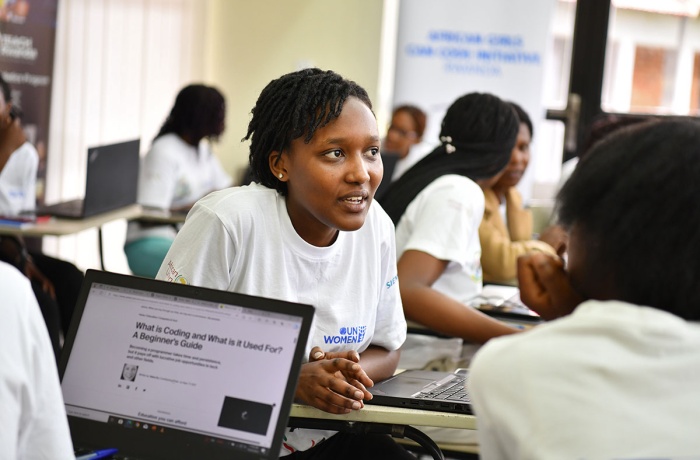
Girls who can code and break stereotypes: an interview with Natacha Sangwa
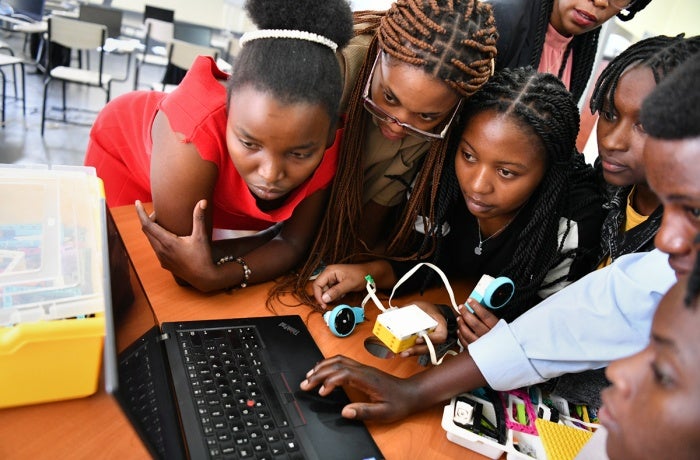
UN Women statement for the International Day for Women and Girls in Science

Creating safe digital spaces free of trolls, doxing, and hate speech

IMAGES
VIDEO
COMMENTS
The length of the interview is highly variable. My advice to you: Ask the person who invited you to interview what the planned format is and what you should prepare. Regardless of the answer, be prepared to answer questions about your masters thesis, your general area of research, and the direction you would like to pursue for your PhD.
Be honest about the things you find challenging, but identify them as training needs and discuss how you expect to improve upon them as part of your PhD. Do answer: I feel that I'm a good written communicator. My existing academic and professional work demonstrates an ability to put forward ideas clearly and concisely.
To ace your Ph.D. program interviews, prepare to answer—and ask—these key questions. You've made it to the last step of the Ph.D. application process: the interview. Congratulations! But amid the excitement and butterflies, don't neglect the crucial next step: preparation. Grad school interviews—in which aspiring graduate students meet ...
Most PhD applications include an interview. This allows your university (and perhaps even your prospective supervisor) to discuss the PhD with you in more detail. This article lists some of the most common PhD interview questions along with their answers. The goal is to help you prepare for a PhD interview and pass with flying colors.
I need your advice on how to prepare for a PhD maths admission interview. I was given two days' notice for an online interview for a phd maths program. The interview is 30 mins long and is going to involve some technical questions about the mathematical background of my research area of interest (applying machine learning in fluid dynamics).
Common PhD Interview Questions. In this guide, we'll share 11 common PhD interview questions and our suggestions on how to answer them. A PhD interview is an essential step in securing a doctorate position. This is because it enables the prospective supervisor to get to know you better and determine whether you'd be a good fit for the project.
Depending on the format for your PhD interview it could involve: A formal question and answer session in front of a postgraduate recruitment panel. A presentation, based on your research proposal or area of expertise. A one-to-one discussion with your prospective supervisor.
A Ph.D. interview could range from an informal meeting with a potential adviser to interviewing with a formal panel. However, all Ph.D. interviews will include questions that concern your academic achievements, field of research, motivation for applying and goals. Here are 10 questions you may encounter in a Ph.D. interview with example answers: 1.
King's College London. The Department of Mathematics at King's College London invites applications for PhD students to start in October 2024. There are a number of fully funded studentships available for excellent candidates. Read more. Funded PhD Programme (Students Worldwide) Maths Research Programme. More Details.
1. Tell us about yourself. This is a popular opener for just about any type of interview. It's meant to be an easy icebreaker, but that doesn't mean there isn't a wrong answer. Make sure to your response is relevant to the context of a PhD interview. Talk about your academic background, motivation, and interests.
Remember that an interview goes two ways. The professors are trying to figure out if you're a good fit for them, but you should also try to figure out if the professor and school is a good fit for you. You don't have to talk about math the entire interview either. Feel free to ask him/her about their expectations for their students.
You're asking this to firstly work out how experienced the professor is at supervising students, based purely on the numbers previously supervised. The reason to ask the second question of how many students gained PhDs is to get an idea of the supervisor's track record of successful supervision. The lower the percentage of students that ...
3 "Phd mathematics" interview questions. Learn about interview questions and interview process for 3 companies.
We hearty thanks to those persons who shared their Interview Questions & Experiences for others' help. We wish you all the best for your future. ISI Phd Math Jrf Interview Ques (Anonymously shared, October 2023). (Added on March 31, 2024) Show that in an odd order group every element has a unique square root.
Employers might ask this question to determine your comfort level with basic math skills. Explain your answer clearly and succinctly, and provide an example if possible. Example: "To convert a fraction into a percentage, divide the top number by the bottom number and multiply by 100. For example, if you wanted to convert 1/4 into a percentage ...
Neeraj Singh Bhauryal. Jul 25, 2014 • 6 min read. This is the record of my interview at IISc Bangalore for Integrated PhD program in Mathematics which took place on 28th May. So I was called at 2pm there and since I was 10th on the list my turn came at 6pm , I was little nervous and excited too. So the panel comprised of 5 Professors Prof ...
The Department of Mathematics at King's College London invites applications for PhD students to start in October 2024. There are a number of fully funded studentships available for excellent candidates. Read more. Funded PhD Programme (Students Worldwide) Maths Research Programme. More Details.
1. Viewing 1 - 2 of 2 interview questions. Glassdoor has 2 interview questions and reports from Math phd interviews. Prepare for your interview. Get hired. Love your job. 2 "Math phd" interview questions. Learn about interview questions and interview process for 2 companies.
Linear Algebra is a key foundation to the field of machine learning and data science, from notations used to describe the operation of algorithms to the implementation of algorithms in code. Follow along and check the 14 most common Linear Algebra Interview Questions every ML engineer and data scientist shall brush before next daa science interview.
Mathematics Mock Interview | IIT Bombay | PhD | Mathematics Interview preparation | EEInterviews are the last stage in the selection process for any job in P...
Here are Mathematics interview questions and answers for freshers as well as experienced candidates to get their dream job. 1) What are the different classes of maths are and what maths you prefer? Different types of field for maths are Calculus, Algebra, and Fractions. I use all kinds of maths, but Calculus is major.
The Crackdown on Student Protesters. Columbia University is at the center of a growing showdown over the war in Gaza and the limits of free speech. April 25, 2024, 6:00 a.m. ET. Share full article ...
On the International Girls in ICT Day, UN Women joins young women and girls globally who are putting a spotlight on leadership in the digital world. Girls' leadership in Information, Communication and Technology (ICT) and Science, Technology, Engineering and Mathematics (STEM) is now more crucial than ever.